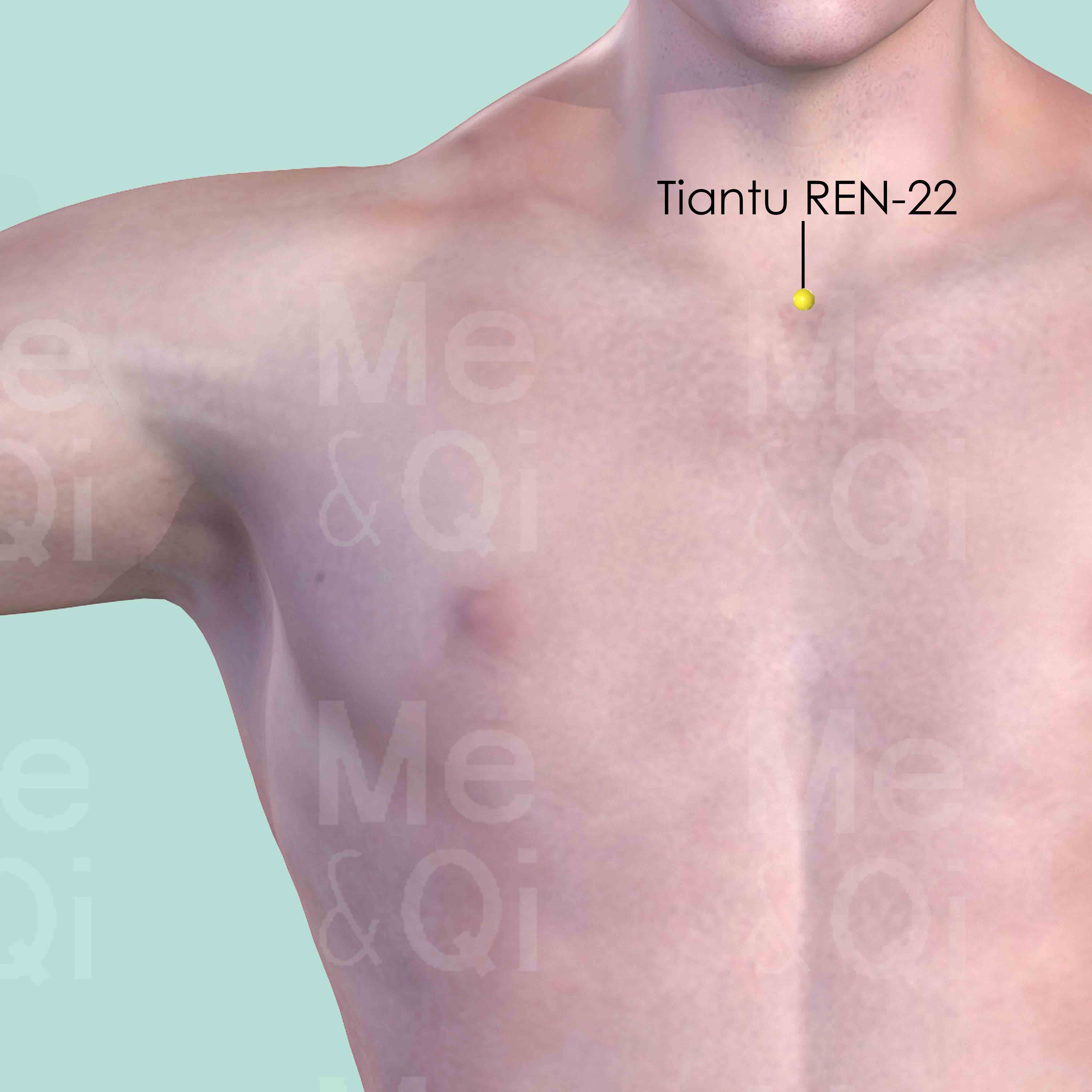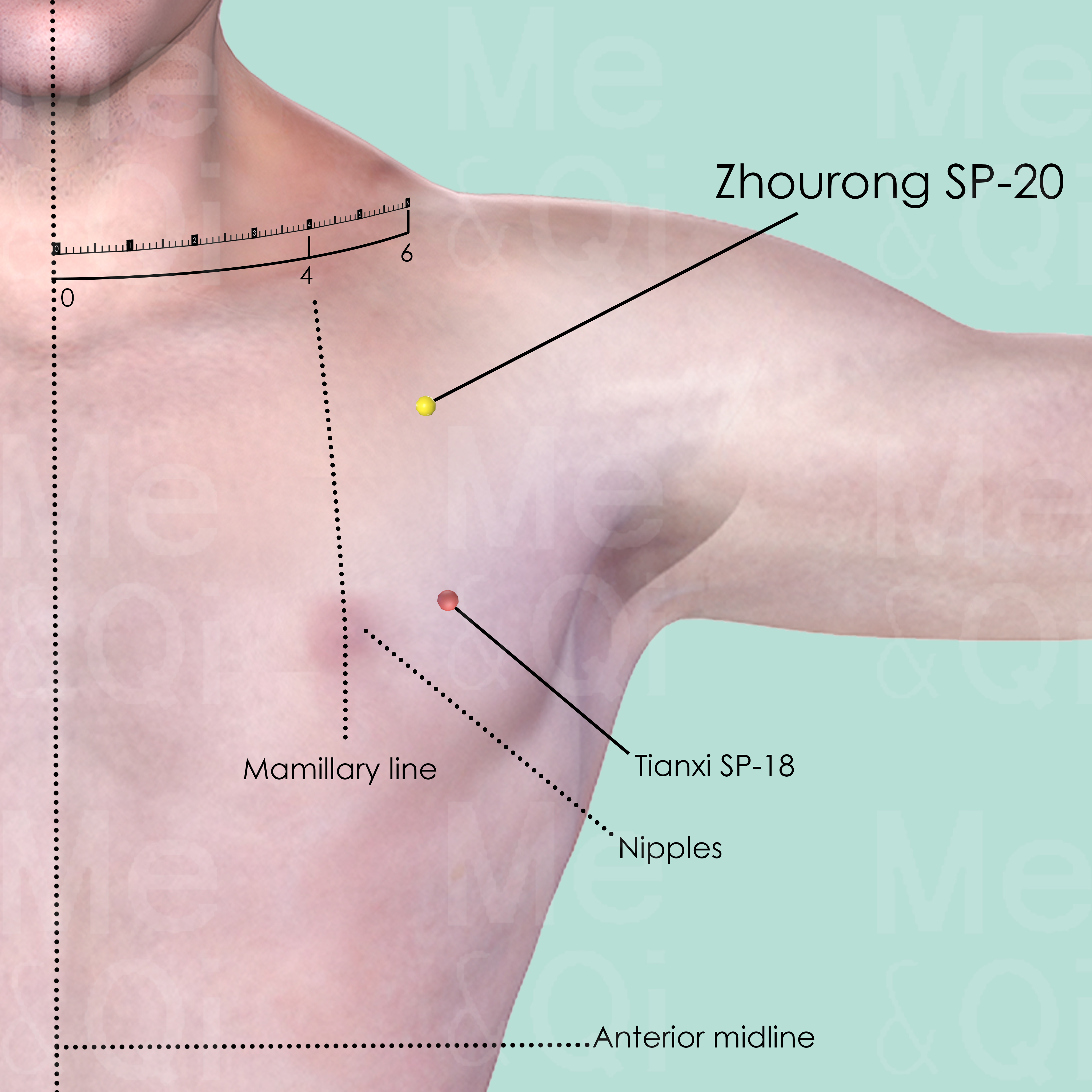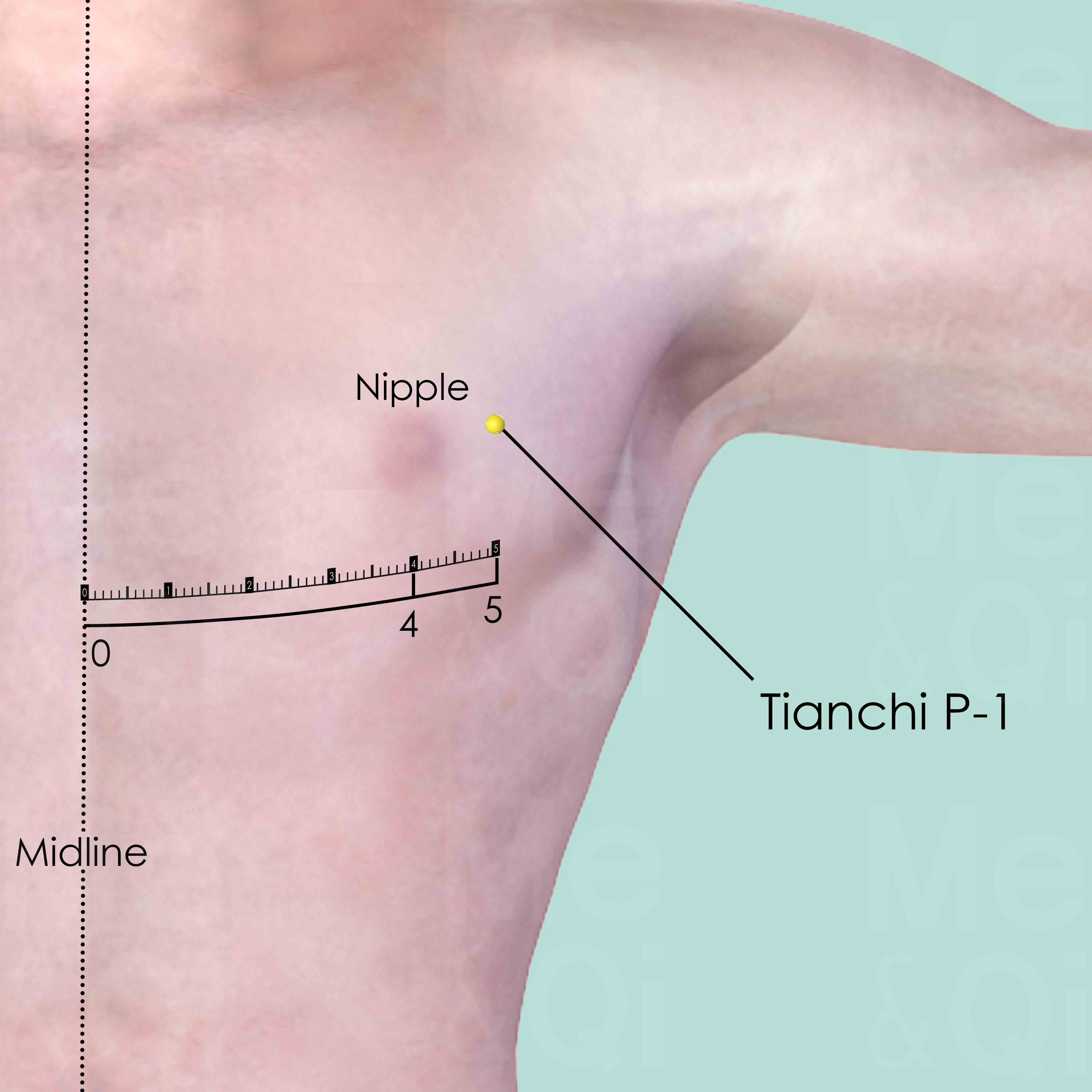Sputumaccording to TCM
Symptom families: Respiratory Secretions, Throat Obstructions and Sensations
Sub-symptom(s): Copious Thick Yellow Sputum Cough With Thin Yellow Sputum Clear Sputum Bloody Sputum Yellowish Phlegm Copious Sputum Coughing With Blood Streaked Sputum Coughing And Wheezing With Copious Sputum Profuse White Sputum
Did you mean? Throat Abscess
What is Sputum?
Sputum, commonly known as Phlegm, is a mucus that can be coughed up from the respiratory tract. It is often a symptom of inflammation or disease within the lungs and bronchial passages. The presence of sputum is typically associated with colds, infections, or chronic lung diseases such as bronchitis. Its characteristics—whether thin or thick, clear, yellow, green, or bloody—can help diagnose the underlying condition. Sputum's nature and persistence can be bothersome and sometimes indicative of the body's attempt to expel harmful pathogens or irritants.
How Does TCM View Sputum?
Traditional Chinese Medicine (TCM) views sputum as a manifestation of disharmony within the body's systems, commonly associated with the accumulation of Phlegm, a pathogenic factor in TCM. Phlegm in TCM is not just the physical secretion but a reflection of a functional imbalance, often related to the Lungs, Spleen, Heart and Kidney systems.
TCM underscores the importance of identifying the type of Phlegm and the underlying disharmony to tailor the treatment, as sputum characteristics can vary from Cold-Phlegm to Phlegm-Fire, each requiring different therapeutic strategies.
Root Causes of Sputum in TCM
TCM recognizes several patterns that can lead to the production of sputum, with Phlegm and Dampness being central concepts. For example, Cold-Phlegm in the Lungs presents with symptoms like coughing and a feeling of chest oppression, pointing to an Excess of Cold and fluid accumulation.
Conversely, Phlegm-Heat can lead to thick, yellow sputum, associated with symptoms of restlessness and a feeling of heat, indicating an internal Heat that 'cooks' the fluids into Phlegm. These patterns reveal the TCM principle that sputum is a sign of the body's struggle to regain balance and clear disturbance.
Explore below more details about what might cause Sputum according to TCM.
- By Syndrome
- By Organ
- Phlegm
- Heat
- Wind
- Dampness
- Cold
- Qi Stagnation
- Mind Disturbance
- Yin Deficiency
- Dryness
- Blood Stasis
- Blood Deficiency
- Yang Deficiency
- View More Causes
- Lung
- Heart
- Pericardium
- Uterus
- Gallbladder
- Stomach
- Kidney
- Triple Burner
- View More Organs
Phlegm
In TCM "Phlegm" as a pattern of disharmony is a complex concept that extends beyond the physical manifestation of mucus. It represents a pathological factor that can disrupt the flow of Qi (vital energy) and blood, leading to various health issues. Phlegm in TCM is seen as a sticky, turbid substance arising from the body's inability to metabolize fluids properly, often due to a dysfunction of the spleen. It's not only associated with respiratory problems like cough and congestion but also with systemic issues. Symptoms can include a feeling of heaviness, mental cloudiness, dizziness, and in some cases, the formation of lumps or masses. Phlegm can even be "invisible," contributing to emotional disturbances like depression or stress. ... see more
Phlegm Patterns That Can Lead to Sputum
Common Symptoms: Dizziness Feeling Of Oppression Of The Chest Feeling Of Heaviness Nausea Depression Shortness Of Breath Stifling Sensation In The Chest Profuse White Sputum
| Pattern Name | Relevant Symptoms | Relevant Formulas |
|---|---|---|
| Phlegm Fire harassing the Pericardium | Mucus, Palpitations, Flushed face, Bitter taste in the mouth, Noisy breathing, Restlessness, Insomnia, Vivid dreaming, Anxiety, Incoherent or confused speech, Confusion, Rash behaviour, Uncontrolled laughing or crying, Verbal aggression, Talking to oneself, Depression, Dull shallow face, Aggression, Feeling of oppression of the chest, Chest pain, Rapid respiration... see more | Wen Dan Tang | Huang Lian Wen Dan Tang | Zhi Bao Dan | Hui Chun Dan |
| Phlegm-Fire harassing the Heart | Mucus, Palpitations, Flushed face, Bitter taste in the mouth, Noisy breathing, Restlessness, Insomnia, Vivid dreaming, Anxiety, Incoherent or confused speech, Confusion, Rash behaviour, Uncontrolled laughing or crying, Verbal aggression, Talking to oneself, Depression, Dull shallow face, Aggression... see more | Wen Dan Tang | Huang Lian Wen Dan Tang | Sheng Tie Luo Yin |
| Damp-Phlegm in the Uterus | Sputum throat, Late menstruation, Amenorrhea, Scanty menstruation, Lower abdominal pain, Abdominal heaviness, Feeling of oppression of the chest, Generalized fatigue, Diarrhea, Dull pale complexion, Obesity, Infertility, Ovarian cysts, Ovarian fibroids, Polycystic ovary syndrome, Pseudocyesis, Sputum, Feeling of heaviness... see more | Cang Fu Dao Tan Wan | Wei Ling Tang | Wan Dai Tang | Xiong Gui Er Chen Tang |
| Cold-Phlegm in the Lungs | Phlegm in throat, Coughing, White and watery sputum, Chills, Cold hands, Sputum, Dizziness, Feeling of oppression of the chest, Feeling of heaviness... see more | Ling Gui Zhu Gan Tang | Ling Gan Wu Wei Jiang Xin Tang | San Zi Yang Qin Tang |
| Damp-Phlegm in the Lungs | Phlegm in throat, Profuse white sputum, Coughing, Pale face, Sputum, Stifling sensation in the chest, Shortness of breath, Discomfort when lying down, Wheezing, Nausea, Feeling of heaviness, Dizziness, Asthma, Chest distension... see more | Er Chen Tang |
| Dry-Phlegm in the Lungs | Phlegm in throat, Dry cough, Scanty sputum, Shortness of breath, Stifling sensation in the chest, Sputum, Feeling of heaviness, Dizziness, Dry throat, Wheezing, Pale face... see more | Bei Mu Gua Lou San |
| Phlegm-Heat in the Lungs | Phlegm in throat, Phlegm, Coughing of copious thick yellow sputum, Coughing, Shortness of breath, Wheezing, Stifling sensation in the chest, Sputum, Feeling hot, Thirst, Head and body heaviness, Dizziness, Copious thick yellow sputum... see more | Wen Dan Tang | Er Chen Tang | Qing Qi Hua Tan Wan | Ma Xing Shi Gan Tang | Qing Xin Li Ge Tang | Ren Shen Ge Jie San | Pi Pa Qing Fei Yin | Xiao Xian Xiong Tang |
| Phlegm-Heat | Coughing and wheezing with copious thick and yellow sputum, Coughing of copious thick yellow sputum, Upper abdominal oppression, Mucous in feces, Depression | Wen Dan Tang | Qing Qi Hua Tan Wan | Ding Chuan Tang | Gun Tan Wan |
| Phlegm | Clear mucus, Feeling of oppression of the chest, Head fog, Dizziness | Ling Gui Zhu Gan Tang | Xiao Ban Xia Tang |
| Wind-Phlegm | Copious sputum, Coughing of phlegm, Dizziness, Feeling of oppression of the chest, Aphasia, Coughing and wheezing with copious sputum, Noisy breathing, Limb numbness... see more | Ban Xia Bai Zhu Tian Ma Tang |
| Turbid Phlegm Blocks Orifices | Excessive phlegm, Coma, Loss of consciousness, Clenching of teeth, Shortness of breath, Pale face, Copious sputum, Drooling... see more | Tong Guan San |
| Phlegm-Fluids above the diaphragm | Coughing of copious thin and white sputum, Profuse white sputum, Coughing, Asthma, Edema, Feeling of oppression of the chest, Dizziness | Ling Gan Wu Wei Jiang Xin Tang | Xiao Qing Long Tang |
| Phlegm-Fluids in the limbs | Coughing of copious thin and white sputum, Coughing with copious white sputum, Feeling of heaviness, Muscle pain, Lack of sweating, Absence of thirst, Profuse white sputum, Swollen limbs, Urinary dysfunction... see more | Xiao Qing Long Tang | Da Qing Long Tang |
| Damp-Phlegm | Profuse white sputum, Focal distention of the chest, Upper abdominal focal distention, Nausea, Sticky taste in the mouth, Absence of thirst, Obesity, Swollen limbs, Abdominal fat... see more | Er Chen Tang | Xiang Sha Liu Jun Zi Tang | Shen Qi Wan |
| Wind-Cold invading the Interior with Phelgm-Heat | Coughing and wheezing with copious thick and yellow sputum, Shortness of breath, Copious thick yellow sputum, Chronic bronchitis, Asthma, Bronchiolitis... see more | Ding Chuan Tang |
| Qi Stagnation in Gallbladder and Stomach with Phlegm Heat | Coughing of copious thick yellow sputum, Nausea or vomiting, Vertigo, Vivid dreaming, Palpitations, Anxiety, Excessive hunger, Focal distention of the chest, Bitter taste in the mouth, Slight thirst, Copious thick yellow sputum... see more | Wen Dan Tang |
| Phlegm clogging the Lungs with Qi Stagnation | Coughing and wheezing with copious sputum, Focal distention of the chest, Lack of appetite, Dyspepsia, Chronic bronchitis, Bronchial asthma, Emphysema, Childhood asthma, Diaphragm pain... see more | San Zi Yang Qin Tang |
| Phlegm-Dampness in the Middle-Burner | Coughing of copious thin and white sputum, Nausea, Vomit, Tight feeling in chest and stomach, Focal distention, Profuse white sputum, Anorexia, Peptic ulcer, Chronic gastritis, Acid reflux, Abdominal pain... see more | Liu Jun Zi Tang |
| Damp-Cold Phlegm | Coughing with copious white sputum, Nausea, Vomit, Tight feeling in chest and stomach, Palpitations, Dizziness, Focal distention, Profuse white sputum, Upper respiratory tract infections, Chronic bronchitis, Emphysema... see more | Er Chen Tang |
Heat
In TCM "Heat" signifies an excess of Yang energy, leading to an imbalance where heat predominates over the body's cool Yin aspects. This condition is metaphorically akin to an internal over-heating. Symptoms indicative of Heat can include feelings of warmth, fever, sweating, irritability, red face, thirst with a preference for cold drinks, and a rapid pulse. The tongue may appear red with a yellow coating. Unlike the common interpretation of heat in terms of temperature, in TCM, it represents a state of hyperactivity or inflammation in the body.... see more
Heat Patterns That Can Lead to Sputum
Common Symptoms: Thirst Insomnia Anxiety Bitter Taste In The Mouth Restlessness Copious Thick Yellow Sputum Flushed Face Depression
| Pattern Name | Relevant Symptoms | Relevant Formulas |
|---|---|---|
| Phlegm Fire harassing the Pericardium | Mucus, Palpitations, Flushed face, Bitter taste in the mouth, Noisy breathing, Restlessness, Insomnia, Vivid dreaming, Anxiety, Incoherent or confused speech, Confusion, Rash behaviour, Uncontrolled laughing or crying, Verbal aggression, Talking to oneself, Depression, Dull shallow face, Aggression, Feeling of oppression of the chest, Chest pain, Rapid respiration... see more | Wen Dan Tang | Huang Lian Wen Dan Tang | Zhi Bao Dan | Hui Chun Dan |
| Phlegm-Fire harassing the Heart | Mucus, Palpitations, Flushed face, Bitter taste in the mouth, Noisy breathing, Restlessness, Insomnia, Vivid dreaming, Anxiety, Incoherent or confused speech, Confusion, Rash behaviour, Uncontrolled laughing or crying, Verbal aggression, Talking to oneself, Depression, Dull shallow face, Aggression... see more | Wen Dan Tang | Huang Lian Wen Dan Tang | Sheng Tie Luo Yin |
| Phlegm-Heat in the Lungs | Phlegm in throat, Phlegm, Coughing of copious thick yellow sputum, Coughing, Shortness of breath, Wheezing, Stifling sensation in the chest, Sputum, Feeling hot, Thirst, Head and body heaviness, Dizziness, Copious thick yellow sputum... see more | Wen Dan Tang | Er Chen Tang | Qing Qi Hua Tan Wan | Ma Xing Shi Gan Tang | Qing Xin Li Ge Tang | Ren Shen Ge Jie San | Pi Pa Qing Fei Yin | Xiao Xian Xiong Tang |
| Phlegm-Heat | Coughing and wheezing with copious thick and yellow sputum, Coughing of copious thick yellow sputum, Upper abdominal oppression, Mucous in feces, Depression | Wen Dan Tang | Qing Qi Hua Tan Wan | Ding Chuan Tang | Gun Tan Wan |
| Wind-Heat invading the Lungs | Coughing of copious thick yellow sputum, Aversion to cold, Fever, Coughing, Sore throat, Congested nose, Nasal discharge, Copious thick yellow sputum, Sneezing, Headaches, Body pain, Thirst, Tonsil swelling... see more | Yin Qiao San |
| Lung Heat | Cough with thin yellow sputum, Feeling hot, Thirst, High fever, Shortness of breath, Perspiration, Acne | Qing Qi Hua Tan Wan | Ma Xing Shi Gan Tang | Pi Pa Qing Fei Yin | Xie Bai San | Huang Lian Jie Du Tang |
| Heat in the Blood | Bloody sputum, Feeling hot, Red skin eruptions, Thirst, Frequent bleeding, Hematochezia, Hematuria, Vomiting blood, Hemoptysis, Nosebleeds, Excessive menstruation... see more | Xi Jiao Di Huang Tang | Gu Jing Wan | Shi Hui San | Bai He Di Huang Tang | Hua Ban Tang | Qing Ying Tang | Qing Re Gu Jing Tang |
| Wind-Heat | Yellow mucus, Aversion to cold, Fever, Sneezing, Coughing, Nasal discharge, Occipital stiffness, Occipital headache, Perspiration, Sore throat, Yellowish phlegm... see more | Yin Qiao San | Sang Ju Yin | Cong Chi Tang | Huo Ren Cong Shi Tang | Jing Jie Lian Qiao Tang | Zhu Ye Cheng Liu Tang | Xiao Feng San | Fang Feng Tong Sheng San | Bing Peng San | Pu Ji Xiao Du Yin |
| Empty-Heat or Fire caused by Yin Deficiency | Coughing with blood-streaked sputum, Afternoon heat sensation, Dry mouth, Preference for sipping, Dry mouth and throat at night, Night sweats, Cardiac burning sensation, Hot palms and soles, Dry stools, Scanty and dark urine, Flushed cheekbones... see more | Qing Hao Bie Jia Tang | Huang Lian E Jiao Tang | Dang Gui Liu Huang Tang | Tian Wang Bu Xin Dan | Suan Zao Ren Tang |
| Wind-Cold invading the Interior with Phelgm-Heat | Coughing and wheezing with copious thick and yellow sputum, Shortness of breath, Copious thick yellow sputum, Chronic bronchitis, Asthma, Bronchiolitis... see more | Ding Chuan Tang |
| Qi Stagnation in Gallbladder and Stomach with Phlegm Heat | Coughing of copious thick yellow sputum, Nausea or vomiting, Vertigo, Vivid dreaming, Palpitations, Anxiety, Excessive hunger, Focal distention of the chest, Bitter taste in the mouth, Slight thirst, Copious thick yellow sputum... see more | Wen Dan Tang |
| Lung and Kidney Yin Deficiency with Empty Fire | Coughing with blood-streaked sputum, Wheezing, Dry throat, Hot palms and soles, Night sweats, Chronic bronchitis, Chronic pharyngitis, Spontaneous pneumothorax, Cor pulmonale, Silicosis, Pulmonary tuberculosis... see more | Bai He Gu Jin Tang |
Wind
In TCM "Wind" is a concept that represents a pattern of disharmony, often characterized by its sudden and unpredictable nature, much like a gusty wind changing direction without warning. This pattern is associated with symptoms that come and go quickly or move around the body, such as itching, tremors, or even certain types of pain. Wind is considered to be a primary cause of illnesses that have these rapidly changing characteristics. In TCM, external Wind often refers to illnesses that start suddenly, like the common cold, believed to be caused by external pathogenic factors like climatic changes. On the other hand, internal Wind can be linked to internal imbalances and can manifest in conditions like dizziness or spasms. ... see more
Wind Patterns That Can Lead to Sputum
Common Symptoms: Headaches Aversion To Cold Fever Nasal Discharge Sneezing Coughing Congested Nose Itchy Throat
| Pattern Name | Relevant Symptoms | Relevant Formulas |
|---|---|---|
| Wind-Heat invading the Lungs | Coughing of copious thick yellow sputum, Aversion to cold, Fever, Coughing, Sore throat, Congested nose, Nasal discharge, Copious thick yellow sputum, Sneezing, Headaches, Body pain, Thirst, Tonsil swelling... see more | Yin Qiao San |
| Exterior Wind | Clear mucus, Aversion to cold, Fever, Headaches, Anemophobia, Nasal discharge, Clear sputum, Itchy throat, Sneezing, Coughing, Muscle pain, Itchy skin... see more | Chuan Xiong Cha Tiao San |
| Wind-Heat | Yellow mucus, Aversion to cold, Fever, Sneezing, Coughing, Nasal discharge, Occipital stiffness, Occipital headache, Perspiration, Sore throat, Yellowish phlegm... see more | Yin Qiao San | Sang Ju Yin | Cong Chi Tang | Huo Ren Cong Shi Tang | Jing Jie Lian Qiao Tang | Zhu Ye Cheng Liu Tang | Xiao Feng San | Fang Feng Tong Sheng San | Bing Peng San | Pu Ji Xiao Du Yin |
| Wind-Phlegm | Copious sputum, Coughing of phlegm, Dizziness, Feeling of oppression of the chest, Aphasia, Coughing and wheezing with copious sputum, Noisy breathing, Limb numbness... see more | Ban Xia Bai Zhu Tian Ma Tang |
| Wind-Cold invading the Lungs | Coughing and wheezing with copious sputum, Aversion to cold, Fever, Itchy throat, Shortness of breath, Congested nose, Nasal discharge, Sneezing, Headaches, Body pain, White and watery sputum... see more | Ma Huang Tang | Ge Gen Tang | Xin Yi San | Zhi Sou San |
| Wind-Cold invading the Interior with Phelgm-Heat | Coughing and wheezing with copious thick and yellow sputum, Shortness of breath, Copious thick yellow sputum, Chronic bronchitis, Asthma, Bronchiolitis... see more | Ding Chuan Tang |
Dampness
"Dampness" in TCM is a concept that describes a pattern of disharmony where the body accumulates excess moisture. Imagine the heavy, sticky feeling you get on a very humid day; that's similar to what dampness feels like internally. It can manifest as a sense of heaviness, bloating, sluggishness, or even a foggy mind. This condition is often thought to arise from environmental factors like living in a damp place, dietary habits that promote moisture in the body, or internal imbalances that hinder the body's ability to process fluids properly. In TCM, dampness can obstruct the normal flow of energy and fluids in the body, leading to various symptoms.... see more
Dampness Patterns That Can Lead to Sputum
Common Symptoms: Nausea Profuse White Sputum Dizziness Generalized Fatigue Obesity Feeling Of Heaviness Chest Distension Palpitations
| Pattern Name | Relevant Symptoms | Relevant Formulas |
|---|---|---|
| Damp-Phlegm in the Uterus | Sputum throat, Late menstruation, Amenorrhea, Scanty menstruation, Lower abdominal pain, Abdominal heaviness, Feeling of oppression of the chest, Generalized fatigue, Diarrhea, Dull pale complexion, Obesity, Infertility, Ovarian cysts, Ovarian fibroids, Polycystic ovary syndrome, Pseudocyesis, Sputum, Feeling of heaviness... see more | Cang Fu Dao Tan Wan | Wei Ling Tang | Wan Dai Tang | Xiong Gui Er Chen Tang |
| Damp-Phlegm in the Lungs | Phlegm in throat, Profuse white sputum, Coughing, Pale face, Sputum, Stifling sensation in the chest, Shortness of breath, Discomfort when lying down, Wheezing, Nausea, Feeling of heaviness, Dizziness, Asthma, Chest distension... see more | Er Chen Tang |
| Damp-Phlegm | Profuse white sputum, Focal distention of the chest, Upper abdominal focal distention, Nausea, Sticky taste in the mouth, Absence of thirst, Obesity, Swollen limbs, Abdominal fat... see more | Er Chen Tang | Xiang Sha Liu Jun Zi Tang | Shen Qi Wan |
| Phlegm-Dampness in the Middle-Burner | Coughing of copious thin and white sputum, Nausea, Vomit, Tight feeling in chest and stomach, Focal distention, Profuse white sputum, Anorexia, Peptic ulcer, Chronic gastritis, Acid reflux, Abdominal pain... see more | Liu Jun Zi Tang |
| Damp-Cold Phlegm | Coughing with copious white sputum, Nausea, Vomit, Tight feeling in chest and stomach, Palpitations, Dizziness, Focal distention, Profuse white sputum, Upper respiratory tract infections, Chronic bronchitis, Emphysema... see more | Er Chen Tang |
Cold
In TCM "Cold" as a pattern of disharmony refers to a specific type of imbalance within the body's systems, often linked to a deficiency or weakness. It's not about feeling physically cold or having a common cold, but rather a metaphorical description of certain symptoms and underlying conditions. When a TCM practitioner says someone suffers from "Cold," it usually implies that the body's Yang energy, which is warm and active, is insufficient or overpowered by Yin energy, which is cool and passive. Symptoms of Cold in TCM can include a general feeling of coldness, cold limbs, pale complexion, low energy, slow metabolism, and a preference for warmth. ... see more
Cold Patterns That Can Lead to Sputum
Common Symptoms: White And Watery Sputum Chills Dizziness Headaches Congested Nose Emphysema Upper Respiratory Tract Infections Shortness Of Breath
| Pattern Name | Relevant Symptoms | Relevant Formulas |
|---|---|---|
| Cold-Phlegm in the Lungs | Phlegm in throat, Coughing, White and watery sputum, Chills, Cold hands, Sputum, Dizziness, Feeling of oppression of the chest, Feeling of heaviness... see more | Ling Gui Zhu Gan Tang | Ling Gan Wu Wei Jiang Xin Tang | San Zi Yang Qin Tang |
| Wind-Cold invading the Lungs | Coughing and wheezing with copious sputum, Aversion to cold, Fever, Itchy throat, Shortness of breath, Congested nose, Nasal discharge, Sneezing, Headaches, Body pain, White and watery sputum... see more | Ma Huang Tang | Ge Gen Tang | Xin Yi San | Zhi Sou San |
| Exterior Dry Cold invading the Lungs | Phlegm, Headaches, Chills without sweating, Congested nose, Dry throat, Sputum, Dry cough, Common cold, Bronchitis, Emphysema, Upper respiratory tract infections... see more | Xing Su San |
| Wind-Cold invading the Interior with Phelgm-Heat | Coughing and wheezing with copious thick and yellow sputum, Shortness of breath, Copious thick yellow sputum, Chronic bronchitis, Asthma, Bronchiolitis... see more | Ding Chuan Tang |
| Damp-Cold Phlegm | Coughing with copious white sputum, Nausea, Vomit, Tight feeling in chest and stomach, Palpitations, Dizziness, Focal distention, Profuse white sputum, Upper respiratory tract infections, Chronic bronchitis, Emphysema... see more | Er Chen Tang |
Qi Stagnation
Qi Stagnation in TCM is like having a traffic jam in your body's energy system. Qi, the vital life force that flows through your body, is supposed to move smoothly to maintain health and balance. But with Qi Stagnation, this flow gets blocked or slowed down, like cars stuck on a highway. This can lead to symptoms like feeling stressed, emotional mood swings, and physical discomfort, often described as a feeling of fullness or tightness, especially in the chest or abdomen. It's as though the body's internal energy circulation is disrupted, causing various issues. TCM sees this as an energy flow problem, different from modern medicine's focus on specific physiological processes.... see more
Qi Stagnation Patterns That Can Lead to Sputum
Common Symptoms: Focal Distention Of The Chest Chronic Gastritis Peptic Ulcer Chronic Hepatitis Chronic Bronchitis Depression Coughing And Wheezing With Copious Sputum Lack Of Appetite
| Pattern Name | Relevant Symptoms | Relevant Formulas |
|---|---|---|
| Qi Stagnation | Mild coughing with copious sputum, General fullness, Moving pain, Depression, Irritability, Mood swings, Sighing | Yue Ju Wan |
| Qi Stagnation in Gallbladder and Stomach with Phlegm Heat | Coughing of copious thick yellow sputum, Nausea or vomiting, Vertigo, Vivid dreaming, Palpitations, Anxiety, Excessive hunger, Focal distention of the chest, Bitter taste in the mouth, Slight thirst, Copious thick yellow sputum... see more | Wen Dan Tang |
| Phlegm clogging the Lungs with Qi Stagnation | Coughing and wheezing with copious sputum, Focal distention of the chest, Lack of appetite, Dyspepsia, Chronic bronchitis, Bronchial asthma, Emphysema, Childhood asthma, Diaphragm pain... see more | San Zi Yang Qin Tang |
Mind Disturbance
In TCM "Shen" refers to the mind or spirit, and a Shen disturbance is a pattern of disharmony that affects the mental and emotional state. This concept reflects the TCM belief in the deep interconnectedness of mind and body. Symptoms of Shen disturbance can vary widely but often include anxiety, insomnia, restlessness, confusion, or in severe cases, hallucinations or delirium. These symptoms indicate an imbalance in the body's energies affecting the heart, which in TCM is not only the center of blood circulation but also the seat of the mind and consciousness. The root of Shen disturbance can be traced to various factors, including emotional stress, physical illness, or an imbalance in fundamental substances like Qi, Yin, or Yang.... see more
Mind Disturbance Patterns That Can Lead to Sputum
Common Symptoms: Palpitations Flushed Face Bitter Taste In The Mouth Noisy Breathing Restlessness Insomnia Vivid Dreaming Anxiety
| Pattern Name | Relevant Symptoms | Relevant Formulas |
|---|---|---|
| Phlegm Fire harassing the Pericardium | Mucus, Palpitations, Flushed face, Bitter taste in the mouth, Noisy breathing, Restlessness, Insomnia, Vivid dreaming, Anxiety, Incoherent or confused speech, Confusion, Rash behaviour, Uncontrolled laughing or crying, Verbal aggression, Talking to oneself, Depression, Dull shallow face, Aggression, Feeling of oppression of the chest, Chest pain, Rapid respiration... see more | Wen Dan Tang | Huang Lian Wen Dan Tang | Zhi Bao Dan | Hui Chun Dan |
| Phlegm-Fire harassing the Heart | Mucus, Palpitations, Flushed face, Bitter taste in the mouth, Noisy breathing, Restlessness, Insomnia, Vivid dreaming, Anxiety, Incoherent or confused speech, Confusion, Rash behaviour, Uncontrolled laughing or crying, Verbal aggression, Talking to oneself, Depression, Dull shallow face, Aggression... see more | Wen Dan Tang | Huang Lian Wen Dan Tang | Sheng Tie Luo Yin |
Yin Deficiency
Yin deficiency in TCM is a pattern of disharmony characterized by a depletion of the body's Yin energy, which represents the cooling, moistening, and nurturing aspects of our physiology. This condition often arises from factors like chronic stress, overwork, insufficient rest, or prolonged illness. Symptoms of Yin deficiency can include a sensation of heat, especially in the afternoon or evening, night sweats, insomnia, a dry mouth or throat, and a red tongue with little coating. There might also be a general feeling of restlessness or irritability. Since Yin is essential for balancing the body's active and warm Yang energy, its deficiency leads to a relative excess of Yang, manifesting as heat or dryness symptoms.... see more
Yin Deficiency Patterns That Can Lead to Sputum
Common Symptoms: Coughing With Blood Streaked Sputum Hot Palms And Soles Night Sweats Wheezing Dry Throat Chronic Bronchitis Chronic Pharyngitis Spontaneous Pneumothorax
| Pattern Name | Relevant Symptoms | Relevant Formulas |
|---|---|---|
| Empty-Heat or Fire caused by Yin Deficiency | Coughing with blood-streaked sputum, Afternoon heat sensation, Dry mouth, Preference for sipping, Dry mouth and throat at night, Night sweats, Cardiac burning sensation, Hot palms and soles, Dry stools, Scanty and dark urine, Flushed cheekbones... see more | Qing Hao Bie Jia Tang | Huang Lian E Jiao Tang | Dang Gui Liu Huang Tang | Tian Wang Bu Xin Dan | Suan Zao Ren Tang |
| Lung and Kidney Yin Deficiency with Empty Fire | Coughing with blood-streaked sputum, Wheezing, Dry throat, Hot palms and soles, Night sweats, Chronic bronchitis, Chronic pharyngitis, Spontaneous pneumothorax, Cor pulmonale, Silicosis, Pulmonary tuberculosis... see more | Bai He Gu Jin Tang |
Dryness
"Dryness" in TCM refers to a state where there is a lack of moisture in the body, much like how the land feels during a drought. It's a pattern of disharmony that can arise from external factors like dry weather or internal issues, such as insufficient fluid intake or certain lifestyle habits. When your body experiences this dryness, you might notice symptoms like dry skin, a scratchy throat, dry eyes, or even constipation. It's similar to the feeling of being parched or having dry, chapped lips in a very dry climate. TCM views this as an imbalance where the body's yin - often associated with moisture and cooling - is depleted.... see more
Dryness Patterns That Can Lead to Sputum
Common Symptoms: Dry Cough Dry Throat Scanty Sputum Shortness Of Breath Stifling Sensation In The Chest Feeling Of Heaviness Dizziness Wheezing
| Pattern Name | Relevant Symptoms | Relevant Formulas |
|---|---|---|
| Dry-Phlegm in the Lungs | Phlegm in throat, Dry cough, Scanty sputum, Shortness of breath, Stifling sensation in the chest, Sputum, Feeling of heaviness, Dizziness, Dry throat, Wheezing, Pale face... see more | Bei Mu Gua Lou San |
| Exterior Dry Cold invading the Lungs | Phlegm, Headaches, Chills without sweating, Congested nose, Dry throat, Sputum, Dry cough, Common cold, Bronchitis, Emphysema, Upper respiratory tract infections... see more | Xing Su San |
Blood Stasis
Blood Stasis in TCM is a concept where the blood flow in the body is not as smooth or efficient as it should be. Imagine a river that's supposed to flow freely, but instead, it's getting blocked or moving too slowly in some parts. This can lead to various health issues, like pain that feels sharp or stabbing, dark bruises, and a complexion that looks purplish. TCM believes that good health relies on the smooth and vibrant flow of Qi and blood throughout the body, so when blood gets stuck, it's like a traffic jam in your body, leading to discomfort or health problems.... see more
Blood Stasis Patterns That Can Lead to Sputum
| Pattern Name | Relevant Symptoms | Relevant Formulas |
|---|---|---|
| Heart Vessel obstructed | Phlegm, Palpitations, Shortness of breath, Depression, Restlessness, Feeling of oppression of the chest, Heart pain, Chest pain, Sputum, Feeling of heaviness, Reluctance to speak, Cold extremities, Sighing, Purple lips, Purple nails, Purple face... see more | Xue Fu Zhu Yu Tang | Chai Hu Shu Gan San | Di Tan Tang | Dang Gui Si Ni Tang |
Blood Deficiency
Blood Deficiency in TCM is like when your body's tank runs low on the vital energy that blood provides. It's not exactly the same as anemia in modern medicine, which is about having too few red blood cells. Instead, Blood Deficiency in TCM is about your body not having enough of the life-giving qualities that blood brings, like nourishment and moisture. This can make you feel tired, look pale, and even feel dizzy or have blurry vision. It's like a garden not getting enough water to stay lush and vibrant. TCM sees this as an imbalance where the body isn't being nourished as it should be, impacting overall health and well-being.... see more
Blood Deficiency Patterns That Can Lead to Sputum
| Pattern Name | Relevant Symptoms | Relevant Formulas |
|---|---|---|
| Loss of Blood | Bloody sputum, Nosebleeds, Uterine hemorrhage, Hematuria, Hematochezia, Hemoptysis, Vomiting blood, Dark menstrual clots, Excessive menstruation... see more | Xi Jiao Di Huang Tang |
Yang Deficiency
Yang deficiency in TCM refers to a state where the body's Yang energy, which is responsible for warmth, activity, and function, is weakened or diminished. This pattern of disharmony often arises from chronic illness, aging, or inherent constitutional weakness. Symptoms of Yang deficiency are typically associated with cold and sluggishness, such as a feeling of coldness, cold extremities, pale complexion, low energy or fatigue, and a desire for warmth. Digestive issues like poor appetite, loose stools, and water retention can also be indicative of Yang deficiency.... see more
Yang Deficiency Patterns That Can Lead to Sputum
| Pattern Name | Relevant Symptoms | Relevant Formulas |
|---|---|---|
| Lung Yang Deficiency | Coughing with copious clear thin sputum, Coughing and wheezing with copious sputum, Cold extremities, Spontaneous sweat, Frequent colds or flu, Pale face, Generalized fatigue, Shortness of breath, Absence of thirst, Wheezing, Weak voice... see more | Gan Cao Gan Jiang Tang | Si Jun Zi Tang | Sheng Mai San |
Lung
In TCM the Lungs are seen as the organ responsible for controlling Qi and respiration, as well as being a key part of the body's defensive system. They are thought to maintain the balance and flow of air and moisture, and are closely linked to the skin and hair. When the Lungs are imbalanced or malfunctioning in TCM, it can lead to respiratory issues like coughing or asthma, a weakened immune system, dry skin, and emotional disturbances such as sadness or grief. These symptoms are believed to arise from disruptions in the Lungs' ability to regulate Qi and protect the body, highlighting their central role in maintaining overall health and well-being.... see more
Lung Patterns That Can Lead to Sputum
Common Symptoms: Shortness Of Breath Wheezing Coughing Dizziness Feeling Of Heaviness Pale Face Stifling Sensation In The Chest Asthma
| Pattern Name | Relevant Symptoms | Relevant Formulas |
|---|---|---|
| Cold-Phlegm in the Lungs | Phlegm in throat, Coughing, White and watery sputum, Chills, Cold hands, Sputum, Dizziness, Feeling of oppression of the chest, Feeling of heaviness... see more | Ling Gui Zhu Gan Tang | Ling Gan Wu Wei Jiang Xin Tang | San Zi Yang Qin Tang |
| Damp-Phlegm in the Lungs | Phlegm in throat, Profuse white sputum, Coughing, Pale face, Sputum, Stifling sensation in the chest, Shortness of breath, Discomfort when lying down, Wheezing, Nausea, Feeling of heaviness, Dizziness, Asthma, Chest distension... see more | Er Chen Tang |
| Dry-Phlegm in the Lungs | Phlegm in throat, Dry cough, Scanty sputum, Shortness of breath, Stifling sensation in the chest, Sputum, Feeling of heaviness, Dizziness, Dry throat, Wheezing, Pale face... see more | Bei Mu Gua Lou San |
| Phlegm-Heat in the Lungs | Phlegm in throat, Phlegm, Coughing of copious thick yellow sputum, Coughing, Shortness of breath, Wheezing, Stifling sensation in the chest, Sputum, Feeling hot, Thirst, Head and body heaviness, Dizziness, Copious thick yellow sputum... see more | Wen Dan Tang | Er Chen Tang | Qing Qi Hua Tan Wan | Ma Xing Shi Gan Tang | Qing Xin Li Ge Tang | Ren Shen Ge Jie San | Pi Pa Qing Fei Yin | Xiao Xian Xiong Tang |
| Wind-Heat invading the Lungs | Coughing of copious thick yellow sputum, Aversion to cold, Fever, Coughing, Sore throat, Congested nose, Nasal discharge, Copious thick yellow sputum, Sneezing, Headaches, Body pain, Thirst, Tonsil swelling... see more | Yin Qiao San |
| Lung Heat | Cough with thin yellow sputum, Feeling hot, Thirst, High fever, Shortness of breath, Perspiration, Acne | Qing Qi Hua Tan Wan | Ma Xing Shi Gan Tang | Pi Pa Qing Fei Yin | Xie Bai San | Huang Lian Jie Du Tang |
| Wind-Cold invading the Lungs | Coughing and wheezing with copious sputum, Aversion to cold, Fever, Itchy throat, Shortness of breath, Congested nose, Nasal discharge, Sneezing, Headaches, Body pain, White and watery sputum... see more | Ma Huang Tang | Ge Gen Tang | Xin Yi San | Zhi Sou San |
| Lung Yang Deficiency | Coughing with copious clear thin sputum, Coughing and wheezing with copious sputum, Cold extremities, Spontaneous sweat, Frequent colds or flu, Pale face, Generalized fatigue, Shortness of breath, Absence of thirst, Wheezing, Weak voice... see more | Gan Cao Gan Jiang Tang | Si Jun Zi Tang | Sheng Mai San |
| Exterior Dry Cold invading the Lungs | Phlegm, Headaches, Chills without sweating, Congested nose, Dry throat, Sputum, Dry cough, Common cold, Bronchitis, Emphysema, Upper respiratory tract infections... see more | Xing Su San |
| Lung and Kidney Yin Deficiency with Empty Fire | Coughing with blood-streaked sputum, Wheezing, Dry throat, Hot palms and soles, Night sweats, Chronic bronchitis, Chronic pharyngitis, Spontaneous pneumothorax, Cor pulmonale, Silicosis, Pulmonary tuberculosis... see more | Bai He Gu Jin Tang |
| Phlegm clogging the Lungs with Qi Stagnation | Coughing and wheezing with copious sputum, Focal distention of the chest, Lack of appetite, Dyspepsia, Chronic bronchitis, Bronchial asthma, Emphysema, Childhood asthma, Diaphragm pain... see more | San Zi Yang Qin Tang |
Heart
In TCM the Heart is considered the "emperor" of all organs, primarily responsible for governing Blood and housing the mind, known as "Shen." It plays a crucial role in maintaining mental-emotional equilibrium and controlling the circulation of Qi and blood throughout the body. When the Heart is imbalanced or malfunctions in TCM, it can lead to a range of issues like heart palpitations, insomnia, dream-disturbed sleep, anxiety, and a flushed complexion. Emotional disturbances such as excessive joy or lack of joy are also seen as signs of Heart disharmony. These symptoms reflect not just physical heart conditions but also the state of one's Shen, indicating the interconnectedness of physical and emotional well-being in TCM.... see more
Heart Patterns That Can Lead to Sputum
Common Symptoms: Palpitations Restlessness Depression Feeling Of Oppression Of The Chest Flushed Face Bitter Taste In The Mouth Noisy Breathing Insomnia
| Pattern Name | Relevant Symptoms | Relevant Formulas |
|---|---|---|
| Phlegm-Fire harassing the Heart | Mucus, Palpitations, Flushed face, Bitter taste in the mouth, Noisy breathing, Restlessness, Insomnia, Vivid dreaming, Anxiety, Incoherent or confused speech, Confusion, Rash behaviour, Uncontrolled laughing or crying, Verbal aggression, Talking to oneself, Depression, Dull shallow face, Aggression... see more | Wen Dan Tang | Huang Lian Wen Dan Tang | Sheng Tie Luo Yin |
| Heart Vessel obstructed | Phlegm, Palpitations, Shortness of breath, Depression, Restlessness, Feeling of oppression of the chest, Heart pain, Chest pain, Sputum, Feeling of heaviness, Reluctance to speak, Cold extremities, Sighing, Purple lips, Purple nails, Purple face... see more | Xue Fu Zhu Yu Tang | Chai Hu Shu Gan San | Di Tan Tang | Dang Gui Si Ni Tang |
Pericardium
In TCM the Pericardium is more than a physical membrane protecting the heart; it's considered an organ system that acts as the "Heart's protector." It plays a crucial role in safeguarding the heart from external pathogenic factors and emotional disturbances. The Pericardium is also involved in regulating blood circulation and influencing emotional well-being, especially in terms of relationships and intimacy. When the Pericardium malfunctions or is imbalanced in TCM, it can lead to symptoms that mirror heart issues, such as chest pain or palpitations, but often with an emotional component like difficulty in forming emotional connections or excessive vulnerability to external stressors. Additionally, a disturbed Pericardium can result in sleep disturbances, anxiety, and in severe cases, mental confusion, reflecting its integral role in both physical heart protection and emotional balance.... see more
Pericardium Patterns That Can Lead to Sputum
| Pattern Name | Relevant Symptoms | Relevant Formulas |
|---|---|---|
| Phlegm Fire harassing the Pericardium | Mucus, Palpitations, Flushed face, Bitter taste in the mouth, Noisy breathing, Restlessness, Insomnia, Vivid dreaming, Anxiety, Incoherent or confused speech, Confusion, Rash behaviour, Uncontrolled laughing or crying, Verbal aggression, Talking to oneself, Depression, Dull shallow face, Aggression, Feeling of oppression of the chest, Chest pain, Rapid respiration... see more | Wen Dan Tang | Huang Lian Wen Dan Tang | Zhi Bao Dan | Hui Chun Dan |
Uterus
In TCM the Uterus (or "Bao Gong") is not just a reproductive organ but a vital system closely linked to Kidney energy, responsible for menstrual health, fertility, and pregnancy. It's also connected to the Heart and Liver, reflecting the importance of emotional and blood health in reproductive wellness. In TCM, the Uterus is seen as a reservoir of Blood and Qi, crucial for reproductive health and general vitality. When the Uterus malfunctions or is imbalanced, it can lead to menstrual irregularities, infertility, miscarriages, or menopausal symptoms. Additionally, there might be symptoms like lower abdominal pain or emotional disturbances such as mood swings, often linked to Liver Qi stagnation. These manifestations highlight the TCM perspective that the health of the Uterus is intertwined with the overall balance of energy and blood in the body, as well as emotional well-being.... see more
Uterus Patterns That Can Lead to Sputum
| Pattern Name | Relevant Symptoms | Relevant Formulas |
|---|---|---|
| Damp-Phlegm in the Uterus | Sputum throat, Late menstruation, Amenorrhea, Scanty menstruation, Lower abdominal pain, Abdominal heaviness, Feeling of oppression of the chest, Generalized fatigue, Diarrhea, Dull pale complexion, Obesity, Infertility, Ovarian cysts, Ovarian fibroids, Polycystic ovary syndrome, Pseudocyesis, Sputum, Feeling of heaviness... see more | Cang Fu Dao Tan Wan | Wei Ling Tang | Wan Dai Tang | Xiong Gui Er Chen Tang |
Gallbladder
In TCM the Gallbladder has a unique role in storing and excreting bile, but more importantly, it's seen as crucial for decision-making and courage. It's closely connected to the Liver, assisting in the smooth flow of Qi (vital energy) and supporting the Liver's role in maintaining emotional balance. When the Gallbladder malfunctions or is imbalanced in TCM, it can lead to physical symptoms like gallstones, jaundice, or a bitter taste in the mouth. There might also be digestive disturbances, particularly related to fat metabolism. On an emotional level, a Gallbladder disorder can manifest as indecisiveness, timidity, or a tendency to easily succumb to stress. These symptoms highlight the TCM view of the Gallbladder as integral to both physical processes and emotional resilience.... see more
Gallbladder Patterns That Can Lead to Sputum
| Pattern Name | Relevant Symptoms | Relevant Formulas |
|---|---|---|
| Qi Stagnation in Gallbladder and Stomach with Phlegm Heat | Coughing of copious thick yellow sputum, Nausea or vomiting, Vertigo, Vivid dreaming, Palpitations, Anxiety, Excessive hunger, Focal distention of the chest, Bitter taste in the mouth, Slight thirst, Copious thick yellow sputum... see more | Wen Dan Tang |
Stomach
In TCM the Stomach is regarded as the "sea of nourishment," pivotal for digesting food and transforming it into Qi and blood. It works closely with the Spleen to distribute these essential nutrients throughout the body. When the Stomach is out of balance or malfunctions in TCM, it often leads to digestive problems such as bloating, nausea, vomiting, poor appetite, or a feeling of fullness. There may also be issues like acid reflux or a sour taste in the mouth. Emotionally, an imbalanced Stomach can contribute to excessive worry and overthinking, reflecting the TCM belief that physical and emotional well-being are deeply interconnected.... see more
Stomach Patterns That Can Lead to Sputum
| Pattern Name | Relevant Symptoms | Relevant Formulas |
|---|---|---|
| Qi Stagnation in Gallbladder and Stomach with Phlegm Heat | Coughing of copious thick yellow sputum, Nausea or vomiting, Vertigo, Vivid dreaming, Palpitations, Anxiety, Excessive hunger, Focal distention of the chest, Bitter taste in the mouth, Slight thirst, Copious thick yellow sputum... see more | Wen Dan Tang |
Kidney
In TCM the Kidneys are regarded as the body's most fundamental reservoir of Essence, known as Jing, which influences growth, reproduction, and aging. They are not just organs for filtering blood, but a holistic system governing vital life forces. When the Kidneys malfunction in TCM, it can manifest as a variety of health issues, such as chronic fatigue, reproductive problems, imbalances in fluid metabolism leading to edema or dryness, lower back pain, and a sense of fear or insecurity.... see more
Kidney Patterns That Can Lead to Sputum
| Pattern Name | Relevant Symptoms | Relevant Formulas |
|---|---|---|
| Lung and Kidney Yin Deficiency with Empty Fire | Coughing with blood-streaked sputum, Wheezing, Dry throat, Hot palms and soles, Night sweats, Chronic bronchitis, Chronic pharyngitis, Spontaneous pneumothorax, Cor pulmonale, Silicosis, Pulmonary tuberculosis... see more | Bai He Gu Jin Tang |
Triple Burner
In TCM the Triple Burner (or San Jiao) is a unique concept rather than a physical organ. It's seen as a system that oversees the flow and balance of Qi and bodily fluids across three regions of the body: the upper (respiratory and cardiovascular systems), middle (digestive system), and lower (urinary and reproductive systems). The Triple Burner facilitates the interaction between these systems, ensuring harmony in bodily functions. When it malfunctions in TCM, it can lead to a variety of symptoms depending on the affected region, such as respiratory issues, digestive problems, or urinary and reproductive disorders. The malfunction can also manifest as general imbalances in energy flow, temperature regulation, and fluid metabolism, reflecting the Triple Burner's role as a coordinator of the body's various processes and its importance in maintaining overall balance and health.... see more
Triple Burner Patterns That Can Lead to Sputum
| Pattern Name | Relevant Symptoms | Relevant Formulas |
|---|---|---|
| Phlegm-Dampness in the Middle-Burner | Coughing of copious thin and white sputum, Nausea, Vomit, Tight feeling in chest and stomach, Focal distention, Profuse white sputum, Anorexia, Peptic ulcer, Chronic gastritis, Acid reflux, Abdominal pain... see more | Liu Jun Zi Tang |
TCM Herbal Formulas for Sputum
To address the root causes of sputum, TCM prescribes specific herbal formulas according to the identified pattern. Wen Dan Tang, with its key ingredient Crow-Dipper Rhizomes, is commonly used to clear Phlegm-Heat, harmonizing the Gallbladder and Stomach, and alleviating symptoms of restlessness.
For Cold-Phlegm patterns, formulas like Ling Gui Zhu Gan Tang are utilized, featuring Poria-Cocos Mushrooms to warm the Lungs and transform Phlegm. These examples illustrate how TCM targets the underlying pattern to effectively resolve the symptom of sputum.
Explore below some TCM herbal formulas used to address sputum, organized by cause and by formula type.
- By Cause
- By Formula Type
- Phlegm
- Heat
- Wind
- Dampness
- Cold
- Qi Stagnation
- Mind Disturbance
- Yin Deficiency
- Dryness
- Blood Stasis
- Blood Deficiency
- Yang Deficiency
- View More Causes
- Formulas that dry dampness and transform phlegm
- Formulas that tonify qi
- Formulas that clear heat from deficiency
- Formulas that clear wind-Cold
- Formulas that dispel phlegm
- Formulas that clear heat and transform phlegm
- Formulas that dredge and disperse external wind
- Formulas that clear wind-Heat
- Formulas that nourish the heart and calm the mind
- Formulas that clear heat and open sensory orifices
- Formulas that secure irregular uterine bleeding and stop vaginal discharge
- Formulas that warm and transform phlegm-Cold
- Formulas that clear heat from the organs
- Formulas that promote qi movement
- Formulas that warm interior cold
- Formulas that warm yang and tonify
- Formulas for a rebellious qi
- External formulas for external disorders
- Formulas that clear heat and resolve toxicity
- Formulas that clear nutritive-level heat
- Formulas that clear early-stage exterior disorders
- Formulas that transform phlegm and extinguish wind
- Formulas that sedate and calm the mind
- Formulas that expel dampness
- Formulas that warm and transform water and dampness
- Formulas that clear internal abscesses and sores
- Formulas that clear lung-Heat
- Formulas that invigorate blood and dispel blood stagnation
- Formulas that disperse dryness and moisten
- Formulas that stop bleeding
- Formulas that clear heat from qi and blood
- Formulas that release the exterior and purge the interior
- Formulas that warm and open sensory orifices
- Formulas that nourish yin and tonify
Top Formula for Phlegm:
Wen Dan Tang
Suitable for Phlegm patterns that may cause sputum, such as Phlegm Fire harassing the Pericardium or Phlegm-Fire harassing the Heart
Learn moreAll Formulas Recommended for Sputum Caused by Phlegm
| Formula | Patterns Suitable For |
|---|---|
| Wen Dan Tang | Phlegm Fire harassing the Pericardium, Phlegm-Fire harassing the Heart, Phlegm-Heat in the Lungs, Phlegm-Heat, Qi Stagnation in Gallbladder and Stomach with Phlegm Heat... see more |
| Er Chen Tang | Damp-Phlegm in the Lungs, Phlegm-Heat in the Lungs, Damp-Cold Phlegm, Damp-Phlegm... see more |
| Qing Qi Hua Tan Wan | Phlegm-Heat in the Lungs, Phlegm-Heat |
| Huang Lian Wen Dan Tang | Phlegm Fire harassing the Pericardium, Phlegm-Fire harassing the Heart |
| Ling Gui Zhu Gan Tang | Cold-Phlegm in the Lungs, Phlegm |
| Ling Gan Wu Wei Jiang Xin Tang | Cold-Phlegm in the Lungs, Phlegm-Fluids above the diaphragm |
| San Zi Yang Qin Tang | Cold-Phlegm in the Lungs, Phlegm clogging the Lungs with Qi Stagnation |
| Ding Chuan Tang | Wind-Cold invading the Interior with Phelgm-Heat, Phlegm-Heat |
| Xiao Qing Long Tang | Phlegm-Fluids above the diaphragm, Phlegm-Fluids in the limbs |
| Ma Xing Shi Gan Tang | Phlegm-Heat in the Lungs |
| Pi Pa Qing Fei Yin | Phlegm-Heat in the Lungs |
| Zhi Bao Dan | Phlegm Fire harassing the Pericardium |
| Hui Chun Dan | Phlegm Fire harassing the Pericardium |
| Sheng Tie Luo Yin | Phlegm-Fire harassing the Heart |
| Cang Fu Dao Tan Wan | Damp-Phlegm in the Uterus |
| Wei Ling Tang | Damp-Phlegm in the Uterus |
| Wan Dai Tang | Damp-Phlegm in the Uterus |
| Xiong Gui Er Chen Tang | Damp-Phlegm in the Uterus |
| Bei Mu Gua Lou San | Dry-Phlegm in the Lungs |
| Qing Xin Li Ge Tang | Phlegm-Heat in the Lungs |
| Ren Shen Ge Jie San | Phlegm-Heat in the Lungs |
| Xiao Xian Xiong Tang | Phlegm-Heat in the Lungs |
| Gun Tan Wan | Phlegm-Heat |
| Xiao Ban Xia Tang | Phlegm |
| Ban Xia Bai Zhu Tian Ma Tang | Wind-Phlegm |
| Tong Guan San | Turbid Phlegm Blocks Orifices |
| Liu Jun Zi Tang | Phlegm-Dampness in the Middle-Burner |
| Da Qing Long Tang | Phlegm-Fluids in the limbs |
| Xiang Sha Liu Jun Zi Tang | Damp-Phlegm |
| Shen Qi Wan | Damp-Phlegm |
Top Formula for Heat:
Wen Dan Tang
Suitable for Heat patterns that may cause sputum, such as Phlegm Fire harassing the Pericardium or Phlegm-Fire harassing the Heart
Learn moreAll Formulas Recommended for Sputum Caused by Heat
| Formula | Patterns Suitable For |
|---|---|
| Wen Dan Tang | Phlegm Fire harassing the Pericardium, Phlegm-Fire harassing the Heart, Phlegm-Heat in the Lungs, Phlegm-Heat, Qi Stagnation in Gallbladder and Stomach with Phlegm Heat... see more |
| Qing Qi Hua Tan Wan | Phlegm-Heat in the Lungs, Phlegm-Heat, Lung Heat |
| Huang Lian Wen Dan Tang | Phlegm Fire harassing the Pericardium, Phlegm-Fire harassing the Heart |
| Ma Xing Shi Gan Tang | Phlegm-Heat in the Lungs, Lung Heat |
| Pi Pa Qing Fei Yin | Phlegm-Heat in the Lungs, Lung Heat |
| Ding Chuan Tang | Wind-Cold invading the Interior with Phelgm-Heat, Phlegm-Heat |
| Yin Qiao San | Wind-Heat invading the Lungs, Wind-Heat |
| Er Chen Tang | Phlegm-Heat in the Lungs |
| Xi Jiao Di Huang Tang | Heat in the Blood |
| Zhi Bao Dan | Phlegm Fire harassing the Pericardium |
| Hui Chun Dan | Phlegm Fire harassing the Pericardium |
| Sheng Tie Luo Yin | Phlegm-Fire harassing the Heart |
| Qing Xin Li Ge Tang | Phlegm-Heat in the Lungs |
| Ren Shen Ge Jie San | Phlegm-Heat in the Lungs |
| Xiao Xian Xiong Tang | Phlegm-Heat in the Lungs |
| Gun Tan Wan | Phlegm-Heat |
| Xie Bai San | Lung Heat |
| Huang Lian Jie Du Tang | Lung Heat |
| Gu Jing Wan | Heat in the Blood |
| Shi Hui San | Heat in the Blood |
| Bai He Di Huang Tang | Heat in the Blood |
| Hua Ban Tang | Heat in the Blood |
| Qing Ying Tang | Heat in the Blood |
| Qing Re Gu Jing Tang | Heat in the Blood |
| Sang Ju Yin | Wind-Heat |
| Cong Chi Tang | Wind-Heat |
| Huo Ren Cong Shi Tang | Wind-Heat |
| Jing Jie Lian Qiao Tang | Wind-Heat |
| Zhu Ye Cheng Liu Tang | Wind-Heat |
| Xiao Feng San | Wind-Heat |
| Fang Feng Tong Sheng San | Wind-Heat |
| Bing Peng San | Wind-Heat |
| Pu Ji Xiao Du Yin | Wind-Heat |
| Bai He Gu Jin Tang | Lung and Kidney Yin Deficiency with Empty Fire |
| Qing Hao Bie Jia Tang | Empty-Heat or Fire caused by Yin Deficiency |
| Huang Lian E Jiao Tang | Empty-Heat or Fire caused by Yin Deficiency |
| Dang Gui Liu Huang Tang | Empty-Heat or Fire caused by Yin Deficiency |
| Tian Wang Bu Xin Dan | Empty-Heat or Fire caused by Yin Deficiency |
| Suan Zao Ren Tang | Empty-Heat or Fire caused by Yin Deficiency |
Top Formula for Wind:
Yin Qiao San
Suitable for Wind patterns that may cause sputum, such as Wind-Heat invading the Lungs or Wind-Heat
Learn moreAll Formulas Recommended for Sputum Caused by Wind
| Formula | Patterns Suitable For |
|---|---|
| Yin Qiao San | Wind-Heat invading the Lungs, Wind-Heat |
| Ding Chuan Tang | Wind-Cold invading the Interior with Phelgm-Heat |
| Chuan Xiong Cha Tiao San | Exterior Wind |
| Sang Ju Yin | Wind-Heat |
| Cong Chi Tang | Wind-Heat |
| Huo Ren Cong Shi Tang | Wind-Heat |
| Jing Jie Lian Qiao Tang | Wind-Heat |
| Zhu Ye Cheng Liu Tang | Wind-Heat |
| Xiao Feng San | Wind-Heat |
| Fang Feng Tong Sheng San | Wind-Heat |
| Bing Peng San | Wind-Heat |
| Pu Ji Xiao Du Yin | Wind-Heat |
| Ban Xia Bai Zhu Tian Ma Tang | Wind-Phlegm |
| Ma Huang Tang | Wind-Cold invading the Lungs |
| Ge Gen Tang | Wind-Cold invading the Lungs |
| Xin Yi San | Wind-Cold invading the Lungs |
| Zhi Sou San | Wind-Cold invading the Lungs |
Top Formula for Dampness:
Er Chen Tang
Suitable for Dampness patterns that may cause sputum, such as Damp-Phlegm in the Lungs or Damp-Cold Phlegm
Learn moreAll Formulas Recommended for Sputum Caused by Dampness
| Formula | Patterns Suitable For |
|---|---|
| Er Chen Tang | Damp-Phlegm in the Lungs, Damp-Cold Phlegm, Damp-Phlegm |
| Cang Fu Dao Tan Wan | Damp-Phlegm in the Uterus |
| Wei Ling Tang | Damp-Phlegm in the Uterus |
| Wan Dai Tang | Damp-Phlegm in the Uterus |
| Xiong Gui Er Chen Tang | Damp-Phlegm in the Uterus |
| Liu Jun Zi Tang | Phlegm-Dampness in the Middle-Burner |
| Xiang Sha Liu Jun Zi Tang | Damp-Phlegm |
| Shen Qi Wan | Damp-Phlegm |
Top Formula for Cold:
Er Chen Tang
Suitable for Cold patterns that may cause sputum, such as Damp-Cold Phlegm
Learn moreAll Formulas Recommended for Sputum Caused by Cold
| Formula | Patterns Suitable For |
|---|---|
| Er Chen Tang | Damp-Cold Phlegm |
| Ling Gui Zhu Gan Tang | Cold-Phlegm in the Lungs |
| Ling Gan Wu Wei Jiang Xin Tang | Cold-Phlegm in the Lungs |
| San Zi Yang Qin Tang | Cold-Phlegm in the Lungs |
| Ding Chuan Tang | Wind-Cold invading the Interior with Phelgm-Heat |
| Xing Su San | Exterior Dry Cold invading the Lungs |
| Ma Huang Tang | Wind-Cold invading the Lungs |
| Ge Gen Tang | Wind-Cold invading the Lungs |
| Xin Yi San | Wind-Cold invading the Lungs |
| Zhi Sou San | Wind-Cold invading the Lungs |
Top Formula for Qi Stagnation:
Wen Dan Tang
Suitable for Qi Stagnation patterns that may cause sputum, such as Qi Stagnation in Gallbladder and Stomach with Phlegm Heat
Learn moreAll Formulas Recommended for Sputum Caused by Qi Stagnation
| Formula | Patterns Suitable For |
|---|---|
| Wen Dan Tang | Qi Stagnation in Gallbladder and Stomach with Phlegm Heat |
| San Zi Yang Qin Tang | Phlegm clogging the Lungs with Qi Stagnation |
| Yue Ju Wan | Qi Stagnation |
Top Formula for Mind Disturbance:
Wen Dan Tang
Suitable for Mind Disturbance patterns that may cause sputum, such as Phlegm Fire harassing the Pericardium or Phlegm-Fire harassing the Heart
Learn moreAll Formulas Recommended for Sputum Caused by Mind Disturbance
| Formula | Patterns Suitable For |
|---|---|
| Wen Dan Tang | Phlegm Fire harassing the Pericardium, Phlegm-Fire harassing the Heart |
| Huang Lian Wen Dan Tang | Phlegm Fire harassing the Pericardium, Phlegm-Fire harassing the Heart |
| Zhi Bao Dan | Phlegm Fire harassing the Pericardium |
| Hui Chun Dan | Phlegm Fire harassing the Pericardium |
| Sheng Tie Luo Yin | Phlegm-Fire harassing the Heart |
Top Formula for Yin Deficiency:
Bai He Gu Jin Tang
Suitable for Yin Deficiency patterns that may cause sputum, such as Lung and Kidney Yin Deficiency with Empty Fire
Learn moreAll Formulas Recommended for Sputum Caused by Yin Deficiency
| Formula | Patterns Suitable For |
|---|---|
| Bai He Gu Jin Tang | Lung and Kidney Yin Deficiency with Empty Fire |
| Qing Hao Bie Jia Tang | Empty-Heat or Fire caused by Yin Deficiency |
| Huang Lian E Jiao Tang | Empty-Heat or Fire caused by Yin Deficiency |
| Dang Gui Liu Huang Tang | Empty-Heat or Fire caused by Yin Deficiency |
| Tian Wang Bu Xin Dan | Empty-Heat or Fire caused by Yin Deficiency |
| Suan Zao Ren Tang | Empty-Heat or Fire caused by Yin Deficiency |
Top Formula for Dryness:
Bei Mu Gua Lou San
Suitable for Dryness patterns that may cause sputum, such as Dry-Phlegm in the Lungs
Learn moreAll Formulas Recommended for Sputum Caused by Dryness
| Formula | Patterns Suitable For |
|---|---|
| Bei Mu Gua Lou San | Dry-Phlegm in the Lungs |
| Xing Su San | Exterior Dry Cold invading the Lungs |
Top Formula for Blood Stasis:
Xue Fu Zhu Yu Tang
Suitable for Blood Stasis patterns that may cause sputum, such as Heart Vessel obstructed
Learn moreAll Formulas Recommended for Sputum Caused by Blood Stasis
| Formula | Patterns Suitable For |
|---|---|
| Xue Fu Zhu Yu Tang | Heart Vessel obstructed |
| Chai Hu Shu Gan San | Heart Vessel obstructed |
| Di Tan Tang | Heart Vessel obstructed |
| Dang Gui Si Ni Tang | Heart Vessel obstructed |
Top Formula for Blood Deficiency:
Xi Jiao Di Huang Tang
Suitable for Blood Deficiency patterns that may cause sputum, such as Loss of Blood
Learn moreTop Formula for Yang Deficiency:
Gan Cao Gan Jiang Tang
Suitable for Yang Deficiency patterns that may cause sputum, such as Lung Yang Deficiency
Learn moreAll Formulas Recommended for Sputum Caused by Yang Deficiency
| Formula | Patterns Suitable For |
|---|---|
| Gan Cao Gan Jiang Tang | Lung Yang Deficiency |
| Si Jun Zi Tang | Lung Yang Deficiency |
| Sheng Mai San | Lung Yang Deficiency |
Formulas that dry Dampness and transform Phlegm
These formulas are suitable for some sputum-causing patterns like Phlegm Fire harassing the Pericardium or Phlegm-Fire harassing the Heart.
One such formula is Wen Dan Tang, with crow-dipper rhizome as a key herb.
Other formulas of this category are listed in the table below.
All "formulas that dry dampness and transform phlegm" recommended for sputum
| Formula | Patterns Suitable For (if applicable) |
|---|---|
| Wen Dan Tang | Phlegm Fire harassing the Pericardium, Phlegm-Fire harassing the Heart, Phlegm-Heat in the Lungs, Phlegm-Heat, Qi Stagnation in Gallbladder and Stomach with Phlegm Heat... see more |
| Er Chen Tang | Damp-Phlegm in the Lungs, Phlegm-Heat in the Lungs, Damp-Cold Phlegm, Damp-Phlegm... see more |
| Huang Lian Wen Dan Tang | Phlegm Fire harassing the Pericardium, Phlegm-Fire harassing the Heart |
| Cang Fu Dao Tan Wan | Damp-Phlegm in the Uterus |
| Xiong Gui Er Chen Tang | Damp-Phlegm in the Uterus |
Formulas that tonify Qi
These formulas are suitable for some sputum-causing patterns like Phlegm-Heat in the Lungs.
One such formula is Ren Shen Ge Jie San, with tokay geckos as a key herb.
Other formulas of this category are listed in the table below.
All "formulas that tonify qi" recommended for sputum
| Formula | Patterns Suitable For (if applicable) |
|---|---|
| Ren Shen Ge Jie San | Phlegm-Heat in the Lungs |
| Si Jun Zi Tang | Lung Yang Deficiency |
| Sheng Mai San | Lung Yang Deficiency |
| Liu Jun Zi Tang | Phlegm-Dampness in the Middle-Burner |
Formulas that clear Wind-Cold
These formulas are suitable for some sputum-causing patterns like Phlegm-Fluids above the diaphragm or Phlegm-Fluids in the limbs.
One such formula is Xiao Qing Long Tang, with ephedra as a key herb.
Other formulas of this category are listed in the table below.
All "formulas that clear wind-Cold" recommended for sputum
| Formula | Patterns Suitable For (if applicable) |
|---|---|
| Xiao Qing Long Tang | Phlegm-Fluids above the diaphragm, Phlegm-Fluids in the limbs |
| Ma Huang Tang | Wind-Cold invading the Lungs |
| Ge Gen Tang | Wind-Cold invading the Lungs |
| Da Qing Long Tang | Phlegm-Fluids in the limbs |
Formulas that dispel Phlegm
These formulas are suitable for some sputum-causing patterns like Dry-Phlegm in the Lungs.
One such formula is Bei Mu Gua Lou San, with fritillary bulb as a key herb.
Other formulas of this category are listed in the table below.
All "formulas that dispel phlegm" recommended for sputum
| Formula | Patterns Suitable For (if applicable) |
|---|---|
| Bei Mu Gua Lou San | Dry-Phlegm in the Lungs |
| Di Tan Tang | Heart Vessel obstructed |
| Xiang Sha Liu Jun Zi Tang | Damp-Phlegm |
Formulas that clear Heat and transform Phlegm
These formulas are suitable for some sputum-causing patterns like Phlegm-Heat in the Lungs or Phlegm-Heat.
One such formula is Qing Qi Hua Tan Wan, with arisaema with bile as a key herb.
Other formulas of this category are listed in the table below.
All "formulas that clear heat and transform phlegm" recommended for sputum
| Formula | Patterns Suitable For (if applicable) |
|---|---|
| Qing Qi Hua Tan Wan | Phlegm-Heat in the Lungs, Phlegm-Heat, Lung Heat |
| Xiao Xian Xiong Tang | Phlegm-Heat in the Lungs |
| Gun Tan Wan | Phlegm-Heat |
Formulas that dredge and disperse External Wind
These formulas are suitable for some sputum-causing patterns like Exterior Wind.
One such formula is Chuan Xiong Cha Tiao San, with szechuan lovage root as a key herb.
Other formulas of this category are listed in the table below.
All "formulas that dredge and disperse external wind" recommended for sputum
| Formula | Patterns Suitable For (if applicable) |
|---|---|
| Chuan Xiong Cha Tiao San | Exterior Wind |
| Xiao Feng San | Wind-Heat |
| Xin Yi San | Wind-Cold invading the Lungs |
Formulas that warm and transform Phlegm-Cold
These formulas are suitable for some sputum-causing patterns like Cold-Phlegm in the Lungs or Phlegm-Fluids above the diaphragm.
One such formula is Ling Gan Wu Wei Jiang Xin Tang, with dried ginger as a key herb.
Other formulas of this category are listed in the table below.
All "formulas that warm and transform phlegm-Cold" recommended for sputum
| Formula | Patterns Suitable For (if applicable) |
|---|---|
| Ling Gan Wu Wei Jiang Xin Tang | Cold-Phlegm in the Lungs, Phlegm-Fluids above the diaphragm |
| San Zi Yang Qin Tang | Cold-Phlegm in the Lungs, Phlegm clogging the Lungs with Qi Stagnation |
Formulas for a rebellious Qi
These formulas are suitable for some sputum-causing patterns like Wind-Cold invading the Interior with Phelgm-Heat or Phlegm-Heat.
One such formula is Ding Chuan Tang, with ginkgo nuts as a key herb.
Other formulas of this category are listed in the table below.
All "formulas for a rebellious qi" recommended for sputum
| Formula | Patterns Suitable For (if applicable) |
|---|---|
| Ding Chuan Tang | Wind-Cold invading the Interior with Phelgm-Heat, Phlegm-Heat |
| Xiao Ban Xia Tang | Phlegm |
Formulas that clear Heat from Deficiency
These formulas are suitable for some sputum-causing patterns like Heat in the Blood.
One such formula is Bai He Di Huang Tang, with lily bulb as a key herb.
Other formulas of this category are listed in the table below.
All "formulas that clear heat from deficiency" recommended for sputum
| Formula | Patterns Suitable For (if applicable) |
|---|---|
| Bai He Di Huang Tang | Heat in the Blood |
| Qing Re Gu Jing Tang | Heat in the Blood |
| Qing Hao Bie Jia Tang | Empty-Heat or Fire caused by Yin Deficiency |
| Dang Gui Liu Huang Tang | Empty-Heat or Fire caused by Yin Deficiency |
Formulas that secure irregular uterine bleeding and stop vaginal discharge
These formulas are suitable for some sputum-causing patterns like Damp-Phlegm in the Uterus.
One such formula is Wan Dai Tang, with atractylodes rhizome as a key herb.
Other formulas of this category are listed in the table below.
All "formulas that secure irregular uterine bleeding and stop vaginal discharge" recommended for sputum
| Formula | Patterns Suitable For (if applicable) |
|---|---|
| Wan Dai Tang | Damp-Phlegm in the Uterus |
| Gu Jing Wan | Heat in the Blood |
Formulas that clear Heat from the Organs
These formulas are suitable for some sputum-causing patterns like Phlegm-Heat in the Lungs or Lung Heat.
One such formula is Ma Xing Shi Gan Tang, with ephedra as a key herb.
Other formulas of this category are listed in the table below.
All "formulas that clear heat from the organs" recommended for sputum
| Formula | Patterns Suitable For (if applicable) |
|---|---|
| Ma Xing Shi Gan Tang | Phlegm-Heat in the Lungs, Lung Heat |
| Xie Bai San | Lung Heat |
Formulas that promote Qi movement
These formulas are suitable for some sputum-causing patterns like Heart Vessel obstructed.
One such formula is Chai Hu Shu Gan San, with bupleurum root as a key herb.
Other formulas of this category are listed in the table below.
All "formulas that promote qi movement" recommended for sputum
| Formula | Patterns Suitable For (if applicable) |
|---|---|
| Chai Hu Shu Gan San | Heart Vessel obstructed |
| Yue Ju Wan | Qi Stagnation |
Formulas that warm Interior Cold
These formulas are suitable for some sputum-causing patterns like Heart Vessel obstructed.
One such formula is Dang Gui Si Ni Tang, with dong quai as a key herb.
Other formulas of this category are listed in the table below.
All "formulas that warm interior cold" recommended for sputum
| Formula | Patterns Suitable For (if applicable) |
|---|---|
| Dang Gui Si Ni Tang | Heart Vessel obstructed |
| Gan Cao Gan Jiang Tang | Lung Yang Deficiency |
External formulas for External disorders
These formulas are suitable for some sputum-causing patterns like Wind-Heat invading the Lungs or Wind-Heat.
One such formula is Yin Qiao San, with honeysuckle flowers as a key herb.
Other formulas of this category are listed in the table below.
All "external formulas for external disorders" recommended for sputum
| Formula | Patterns Suitable For (if applicable) |
|---|---|
| Yin Qiao San | Wind-Heat invading the Lungs, Wind-Heat |
| Bing Peng San | Wind-Heat |
Formulas that clear Heat and resolve toxicity
These formulas are suitable for some sputum-causing patterns like Lung Heat.
One such formula is Huang Lian Jie Du Tang, with goldthread rhizome as a key herb.
Other formulas of this category are listed in the table below.
All "formulas that clear heat and resolve toxicity" recommended for sputum
| Formula | Patterns Suitable For (if applicable) |
|---|---|
| Huang Lian Jie Du Tang | Lung Heat |
| Pu Ji Xiao Du Yin | Wind-Heat |
Formulas that clear nutritive-level Heat
These formulas are suitable for some sputum-causing patterns like Heat in the Blood or Loss of Blood.
One such formula is Xi Jiao Di Huang Tang, with water buffalo horn as a key herb.
Other formulas of this category are listed in the table below.
All "formulas that clear nutritive-level heat" recommended for sputum
| Formula | Patterns Suitable For (if applicable) |
|---|---|
| Xi Jiao Di Huang Tang | Heat in the Blood, Loss of Blood |
| Qing Ying Tang | Heat in the Blood |
Formulas that transform Phlegm and extinguish Wind
These formulas are suitable for some sputum-causing patterns like Wind-Phlegm.
One such formula is Ban Xia Bai Zhu Tian Ma Tang, with crow-dipper rhizome as a key herb.
Other formulas of this category are listed in the table below.
All "formulas that transform phlegm and extinguish wind" recommended for sputum
| Formula | Patterns Suitable For (if applicable) |
|---|---|
| Ban Xia Bai Zhu Tian Ma Tang | Wind-Phlegm |
| Zhi Sou San | Wind-Cold invading the Lungs |
Formulas that warm and transform water and Dampness
These formulas are suitable for some sputum-causing patterns like Cold-Phlegm in the Lungs or Phlegm.
One such formula is Ling Gui Zhu Gan Tang, with poria-cocos mushroom as a key herb.
Formulas that clear Lung-Heat
These formulas are suitable for some sputum-causing patterns like Phlegm-Heat in the Lungs or Lung Heat.
One such formula is Pi Pa Qing Fei Yin, with loquat leaves as a key herb.
Formulas that clear Wind-Heat
These formulas are suitable for some sputum-causing patterns like Wind-Heat.
One such formula is Sang Ju Yin, with mulberry leaves as a key herb.
Other formulas of this category are listed in the table below.
All "formulas that clear wind-Heat" recommended for sputum
| Formula | Patterns Suitable For (if applicable) |
|---|---|
| Sang Ju Yin | Wind-Heat |
| Jing Jie Lian Qiao Tang | Wind-Heat |
| Zhu Ye Cheng Liu Tang | Wind-Heat |
Formulas that nourish the Heart and calm the Mind
These formulas are suitable for some sputum-causing patterns like Empty-Heat or Fire caused by Yin Deficiency.
One such formula is Huang Lian E Jiao Tang, with goldthread rhizome as a key herb.
Other formulas of this category are listed in the table below.
All "formulas that nourish the heart and calm the mind" recommended for sputum
| Formula | Patterns Suitable For (if applicable) |
|---|---|
| Huang Lian E Jiao Tang | Empty-Heat or Fire caused by Yin Deficiency |
| Tian Wang Bu Xin Dan | Empty-Heat or Fire caused by Yin Deficiency |
| Suan Zao Ren Tang | Empty-Heat or Fire caused by Yin Deficiency |
Formulas that clear Heat and open sensory orifices
These formulas are suitable for some sputum-causing patterns like Phlegm Fire harassing the Pericardium.
One such formula is Zhi Bao Dan, with water buffalo horn as a key herb.
Other formulas of this category are listed in the table below.
All "formulas that clear heat and open sensory orifices" recommended for sputum
| Formula | Patterns Suitable For (if applicable) |
|---|---|
| Zhi Bao Dan | Phlegm Fire harassing the Pericardium |
| Hui Chun Dan | Phlegm Fire harassing the Pericardium |
Formulas that warm Yang and tonify
These formulas are suitable for some sputum-causing patterns like Damp-Phlegm.
One such formula is Shen Qi Wan, with prepared aconite as a key herb.
Other formulas of this category are listed in the table below.
All "formulas that warm yang and tonify" recommended for sputum
| Formula | Patterns Suitable For (if applicable) |
|---|---|
| Shen Qi Wan | Damp-Phlegm |
| Ji Sheng Shen Qi Wan | Not applicable |
Formulas that clear early-stage Exterior disorders
These formulas are suitable for some sputum-causing patterns like Wind-Heat.
One such formula is Cong Chi Tang, with scallions as a key herb.
Other formulas of this category are listed in the table below.
All "formulas that clear early-stage exterior disorders" recommended for sputum
| Formula | Patterns Suitable For (if applicable) |
|---|---|
| Cong Chi Tang | Wind-Heat |
| Huo Ren Cong Shi Tang | Wind-Heat |
Formulas that sedate and calm the Mind
These formulas are suitable for some sputum-causing patterns like Phlegm-Fire harassing the Heart.
One such formula is Sheng Tie Luo Yin, with oxidized iron filing as a key herb.
Formulas that expel Dampness
These formulas are suitable for some sputum-causing patterns like Damp-Phlegm in the Uterus.
One such formula is Wei Ling Tang, with water plantain as a key herb.
Formulas that clear internal abscesses and sores
These formulas are suitable for some sputum-causing patterns like Phlegm-Heat in the Lungs.
One such formula is Qing Xin Li Ge Tang, with saposhnikovia root as a key herb.
Formulas that invigorate Blood and dispel Blood Stagnation
These formulas are suitable for some sputum-causing patterns like Heart Vessel obstructed.
One such formula is Xue Fu Zhu Yu Tang, with peach kernel as a key herb.
Formulas that disperse Dryness and moisten
These formulas are suitable for some sputum-causing patterns like Exterior Dry Cold invading the Lungs.
One such formula is Xing Su San, with apricot seed as a key herb.
Formulas that stop bleeding
These formulas are suitable for some sputum-causing patterns like Heat in the Blood.
One such formula is Shi Hui San, with japanese thistle as a key herb.
Formulas that clear Heat from Qi and Blood
These formulas are suitable for some sputum-causing patterns like Heat in the Blood.
One such formula is Hua Ban Tang, with gypsum as a key herb.
Formulas that release the Exterior and purge the Interior
These formulas are suitable for some sputum-causing patterns like Wind-Heat.
One such formula is Fang Feng Tong Sheng San, with saposhnikovia root as a key herb.
Formulas that warm and open sensory orifices
These formulas are suitable for some sputum-causing patterns like Turbid Phlegm Blocks Orifices.
One such formula is Tong Guan San, with chinese honeylocust abnormal fruit as a key herb.
Formulas that nourish Yin and tonify
These formulas are suitable for some sputum-causing patterns like Lung and Kidney Yin Deficiency with Empty Fire.
One such formula is Bai He Gu Jin Tang, with lily bulb as a key herb.
Acupoints for Sputum
In TCM, acupuncture is employed to complement herbal treatment for sputum, with specific points selected for their impact on Phlegm and Qi. Tiantu REN-22, located in the suprasternal fossa, is a significant point for descending Lung Qi, benefiting the throat, and resolving Phlegm.
By stimulating such points, TCM aims to restore the proper movement of Qi and fluids in the body, reducing the production and accumulation of sputum, and thus treating both the symptom and its root cause.
Explore below some acupoints used to address sputum, organized by meridian.
- By Meridian
- Lung Channel
- Stomach Channel
- Directing Vessel
- Bladder Channel
- Spleen Channel
- Kidney Channel
- Gall Bladder Channel
- Pericardium Channel
- Triple Burner Channel
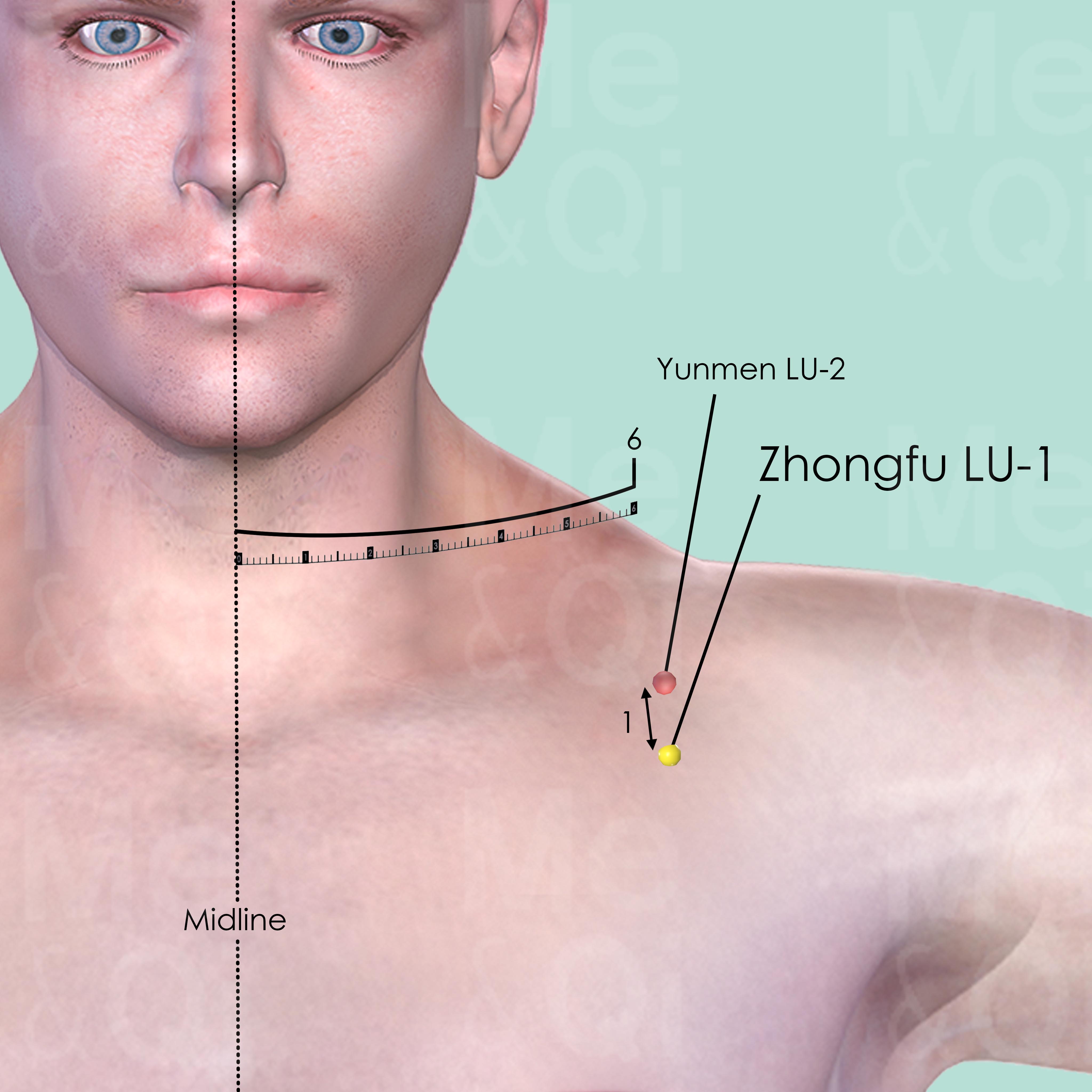
Zhongfu LU-1
On the lateral aspect of the chest, in the 1st intercostal space, 6 cun lateral to the midline, 1 cun inferior to Yunmen LU-2. Below the acromial extremity of the clavicle, slightly medial to the lower border of the coracoid process.
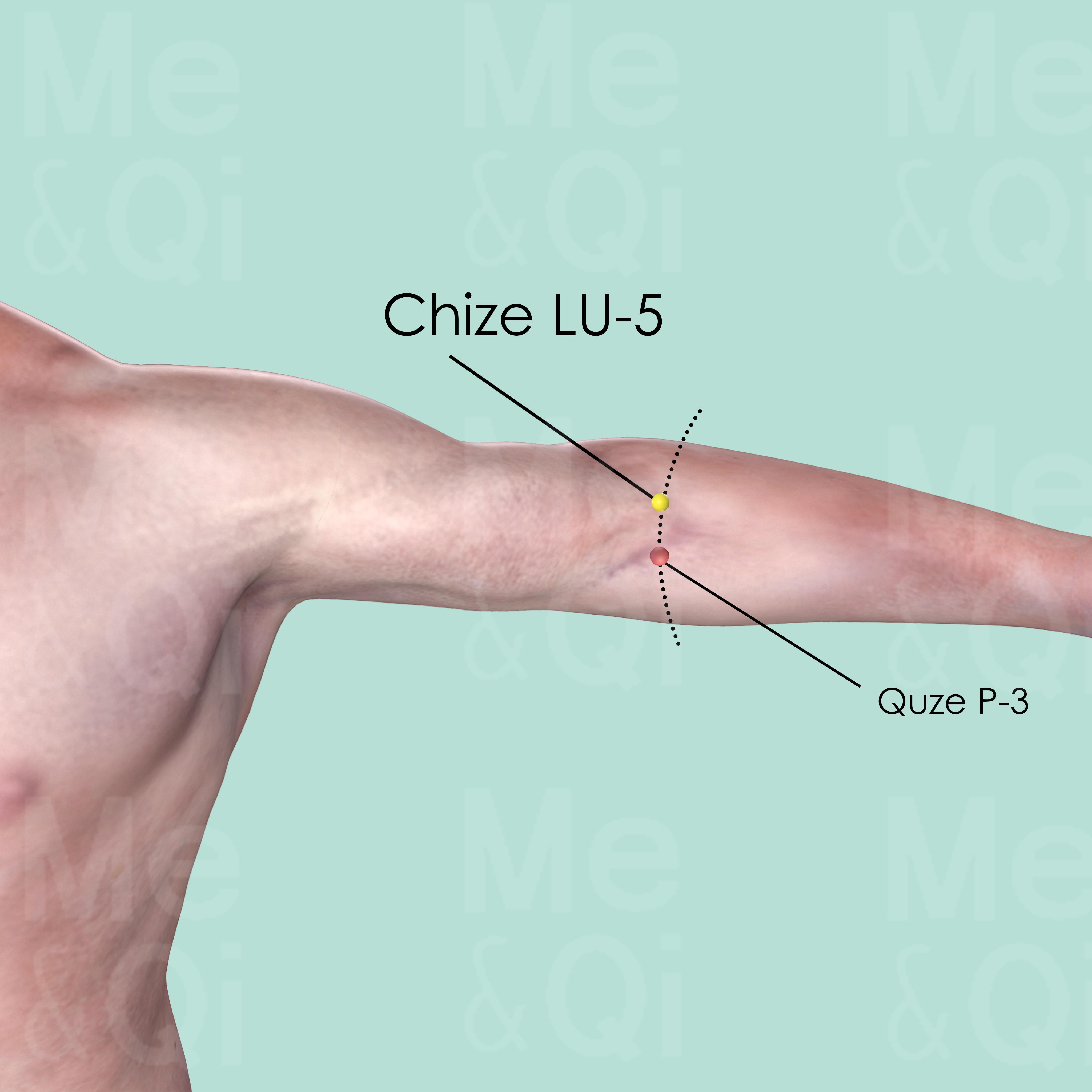
Chize LU-5
On the cubital crease, on the redial aspect of the biceps tendon. It can be easily identified when the elbow is slightly flexed.
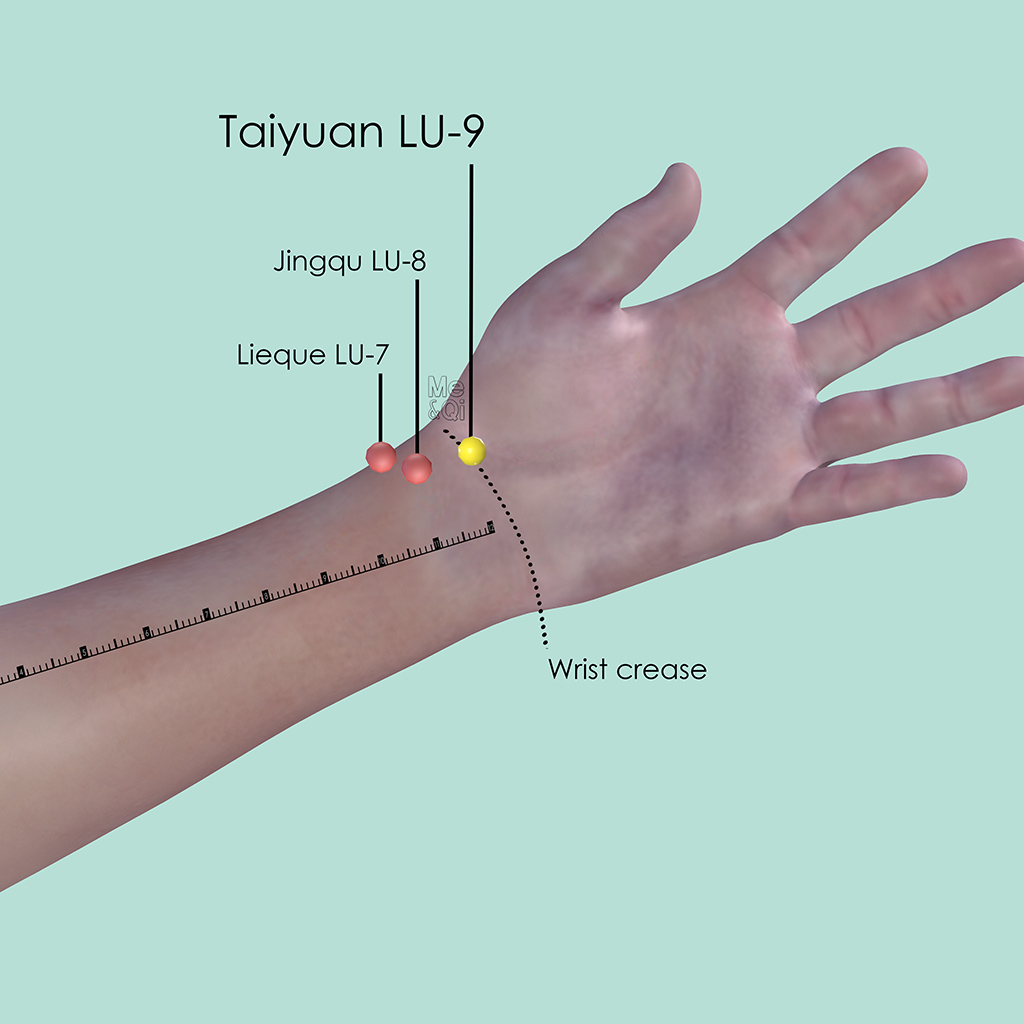
Taiyuan LU-9
At the wrist crease (wrist joint space), in the depression on the radial aspect of the radial artery and ulnar to the tendon of the abductor pollicis longus muscle.
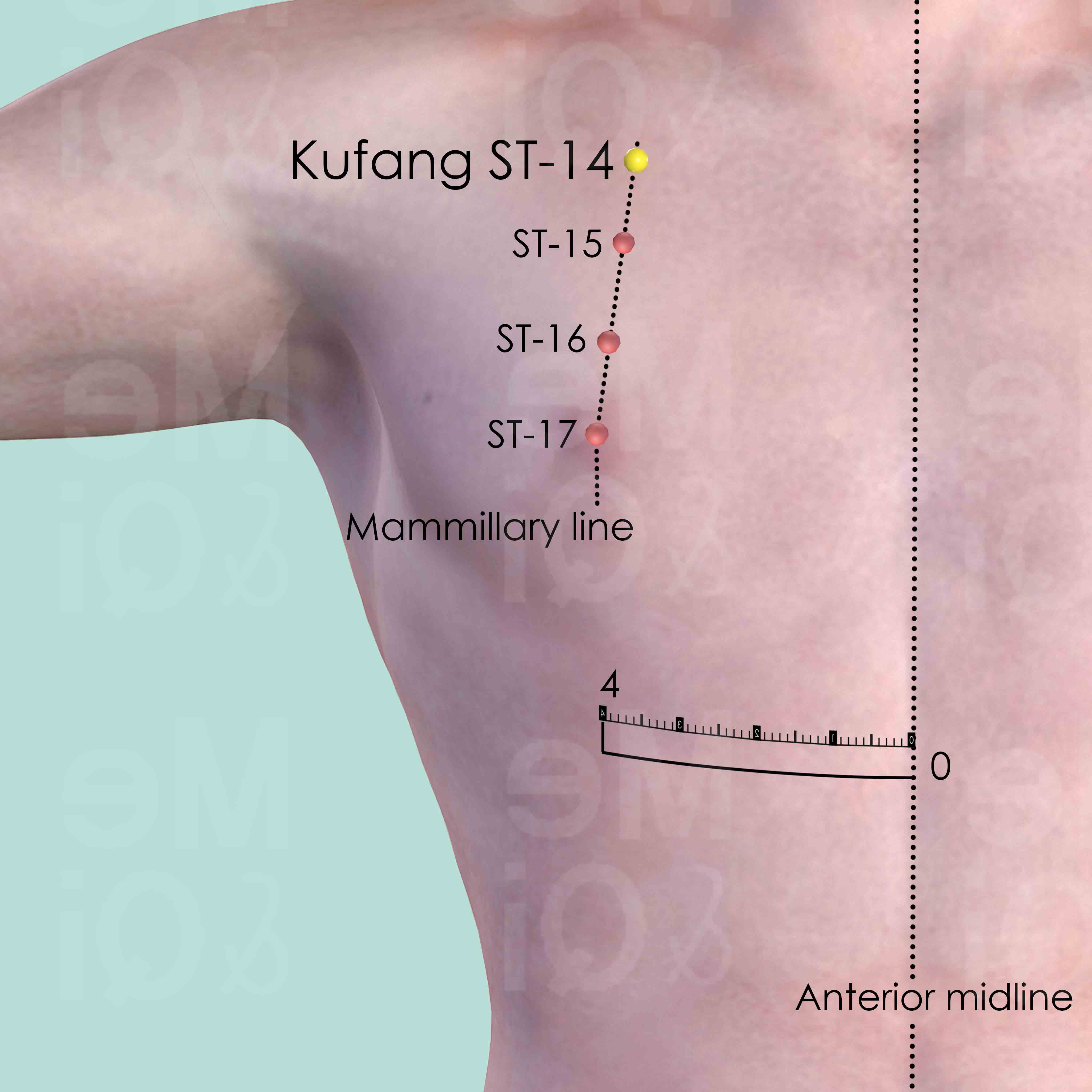
Kufang ST-14
In the 1st intercostal space, on the mammillary line, 4 cun lateral to the anterior midline.
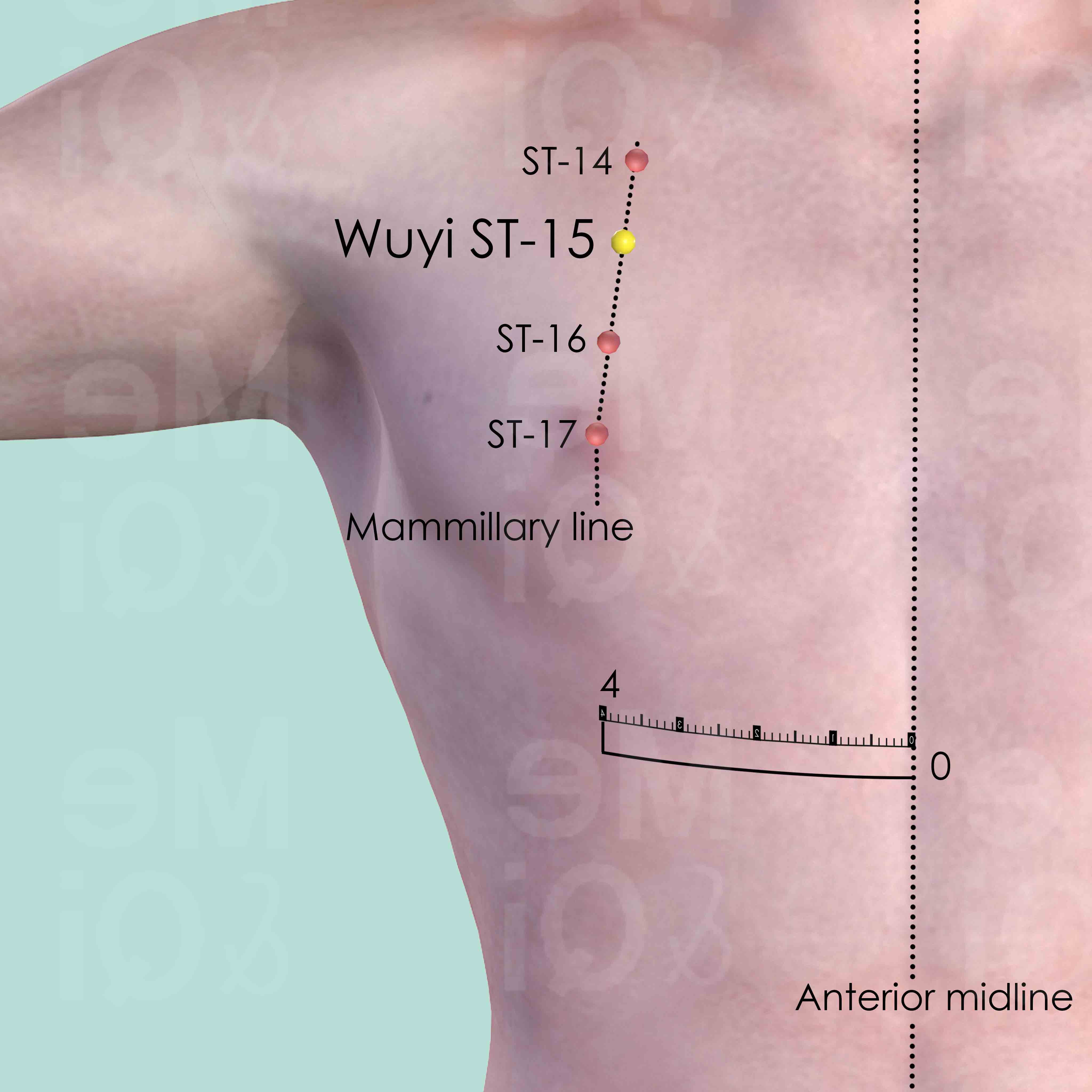
Wuyi ST-15
In the 2nd intercostal space, on the mammillary line, 4 cun lateral to the anterior midline.
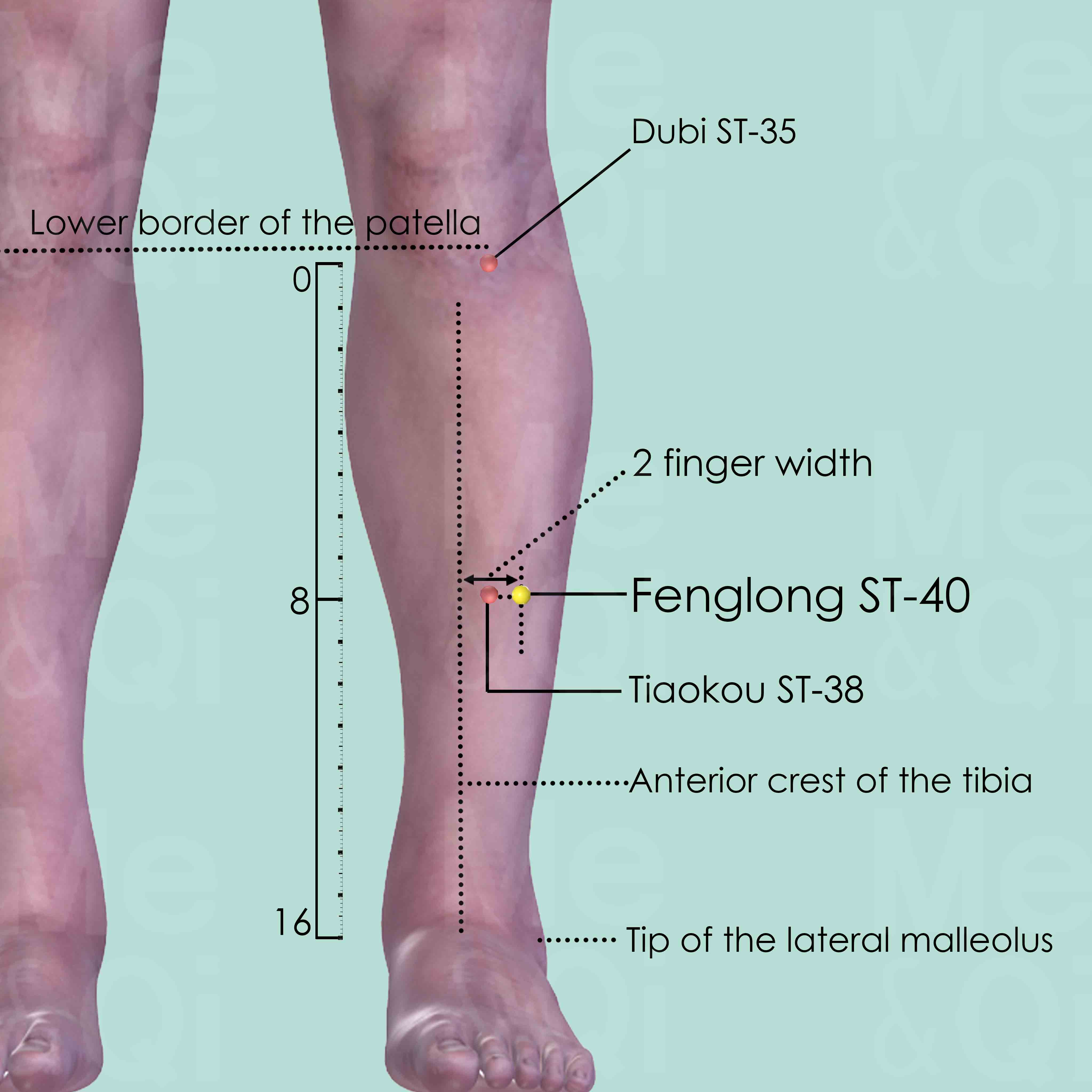
Fenglong ST-40
Midway between Dubi ST-35 and Jiexi ST-41, two middle finger-width from the anterior crest of the tibia, or one middle finger-width from Tiaokou ST-38.
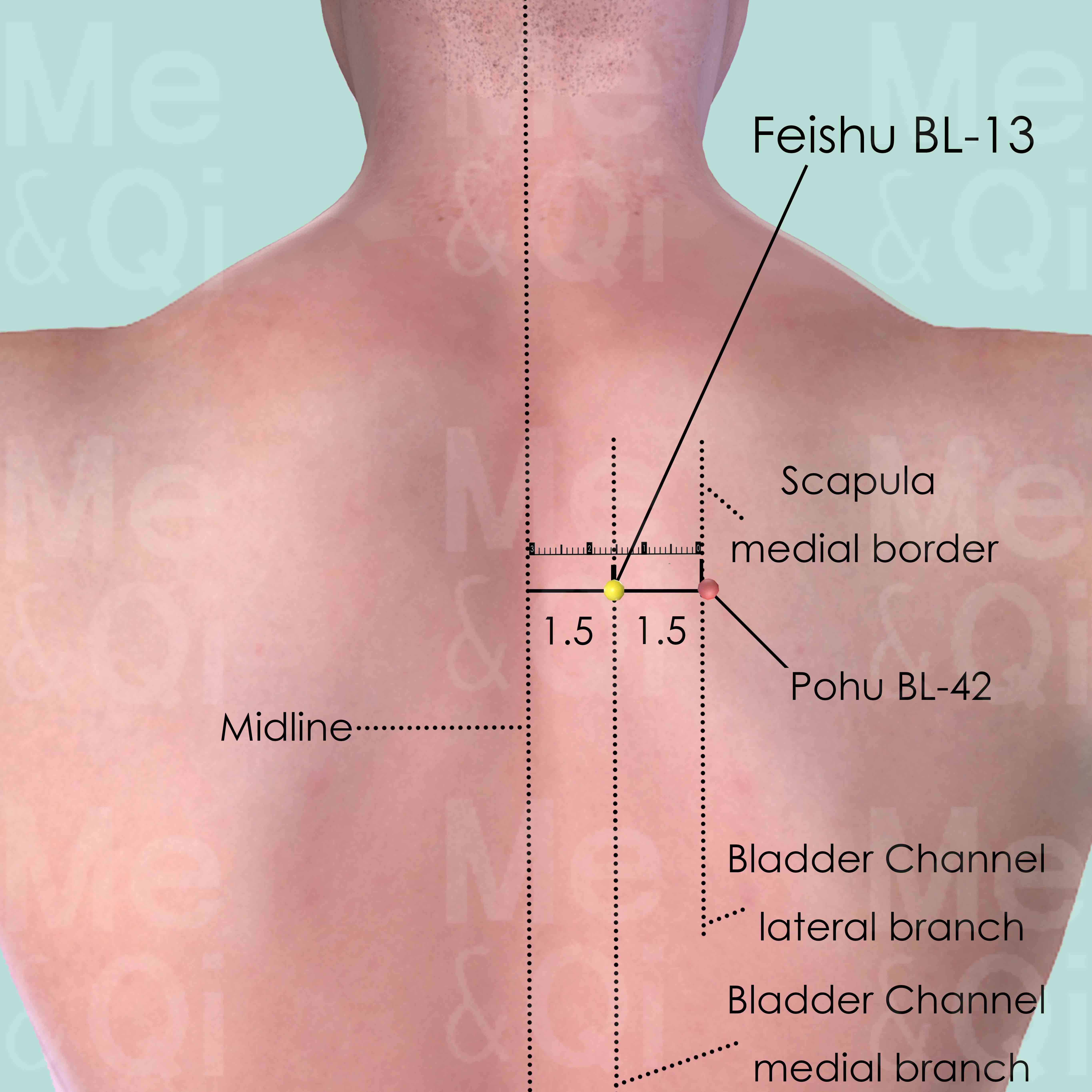
Feishu BL-13
1.5 cun lateral to the lower border of the spinous process of the 3rd thoracic vertebra (T3).
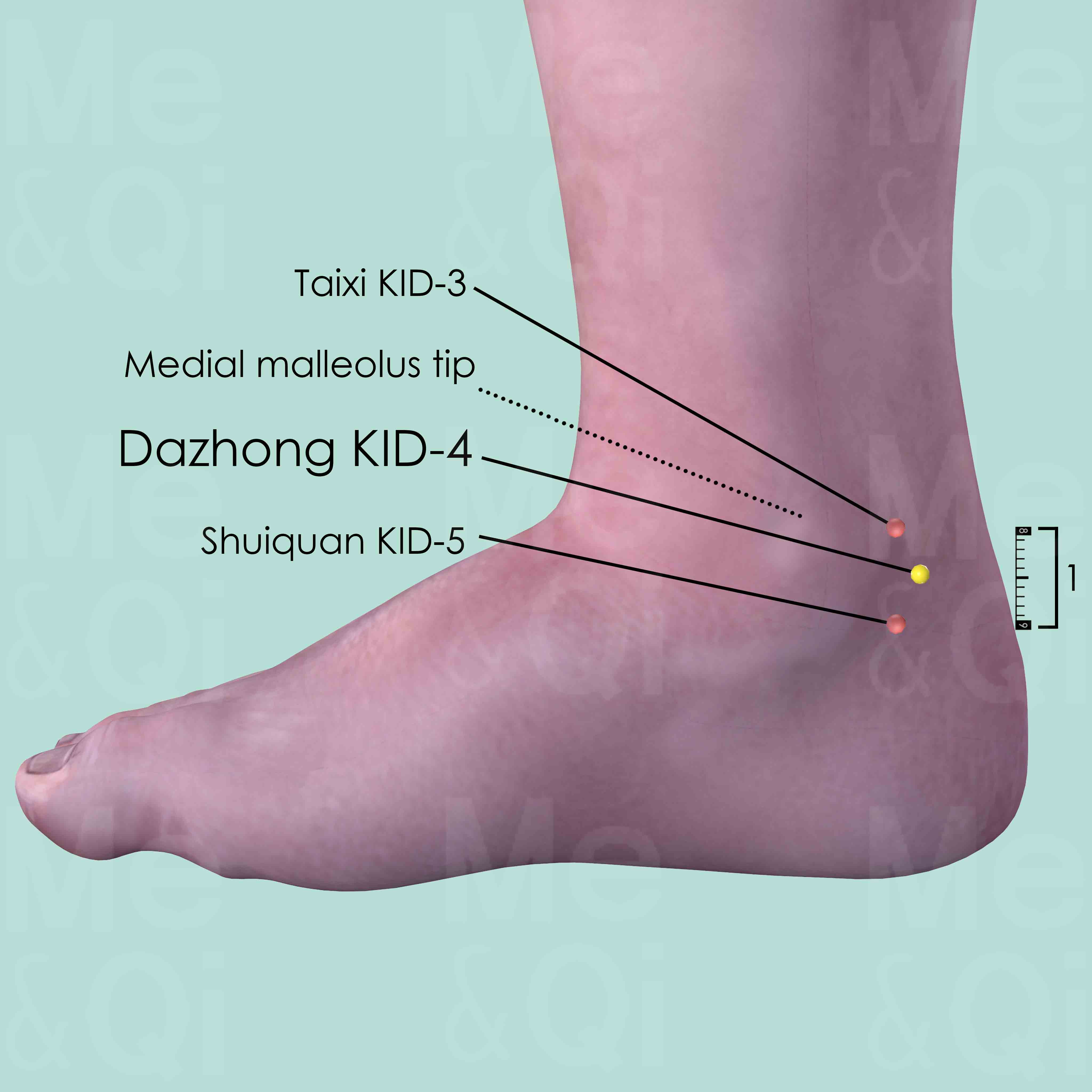
Dazhong KID-4
Posterior and inferior to the medial malleolus, in the depression medial to the Achilles tendon, superior to its insertion at the calcaneus.
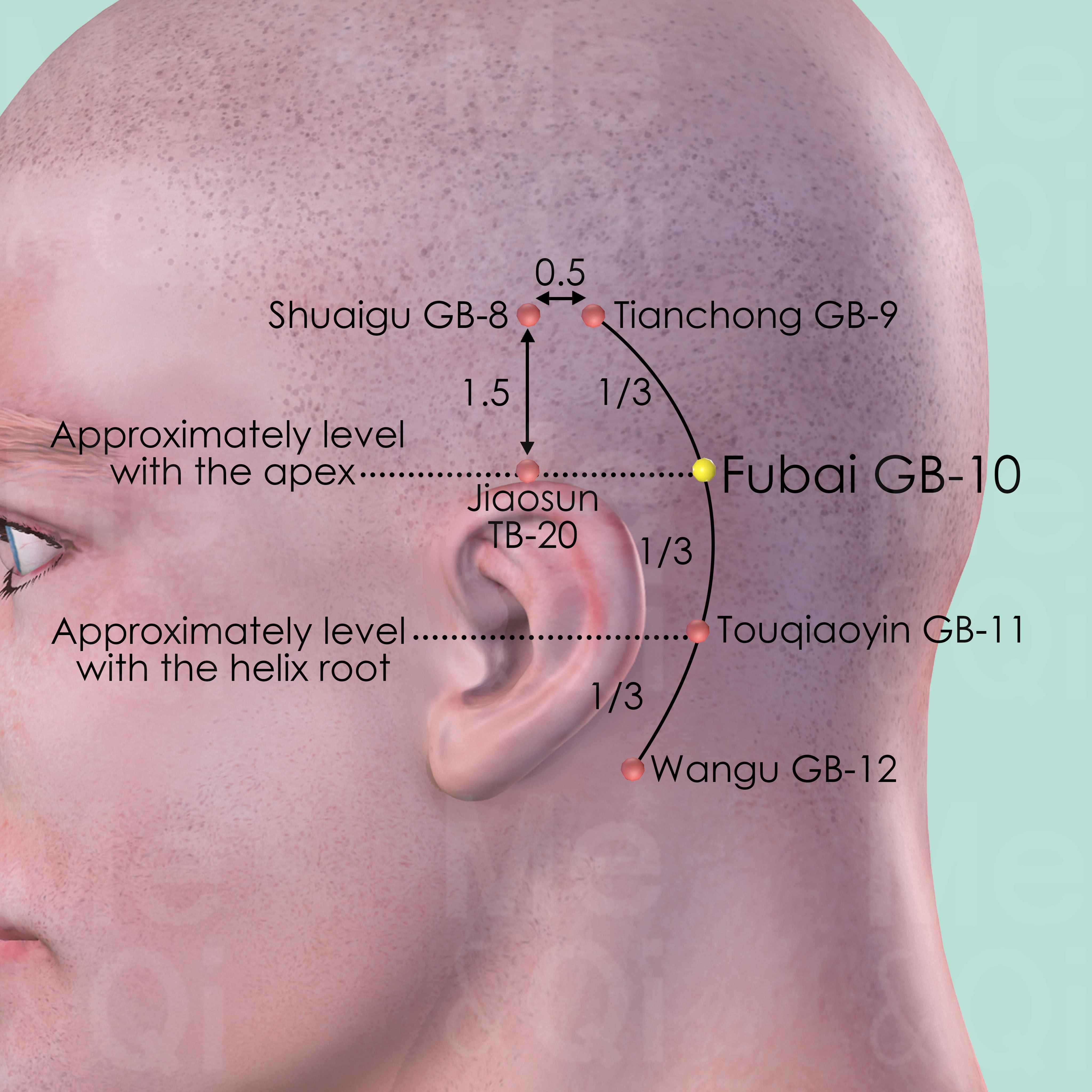
Fubai GB-10
Posterior and superior to the mastoid process, at the junction of the upper third and the two lower thirds of the curved line connecting Tianchong GB-9 and Wangu GB-12.
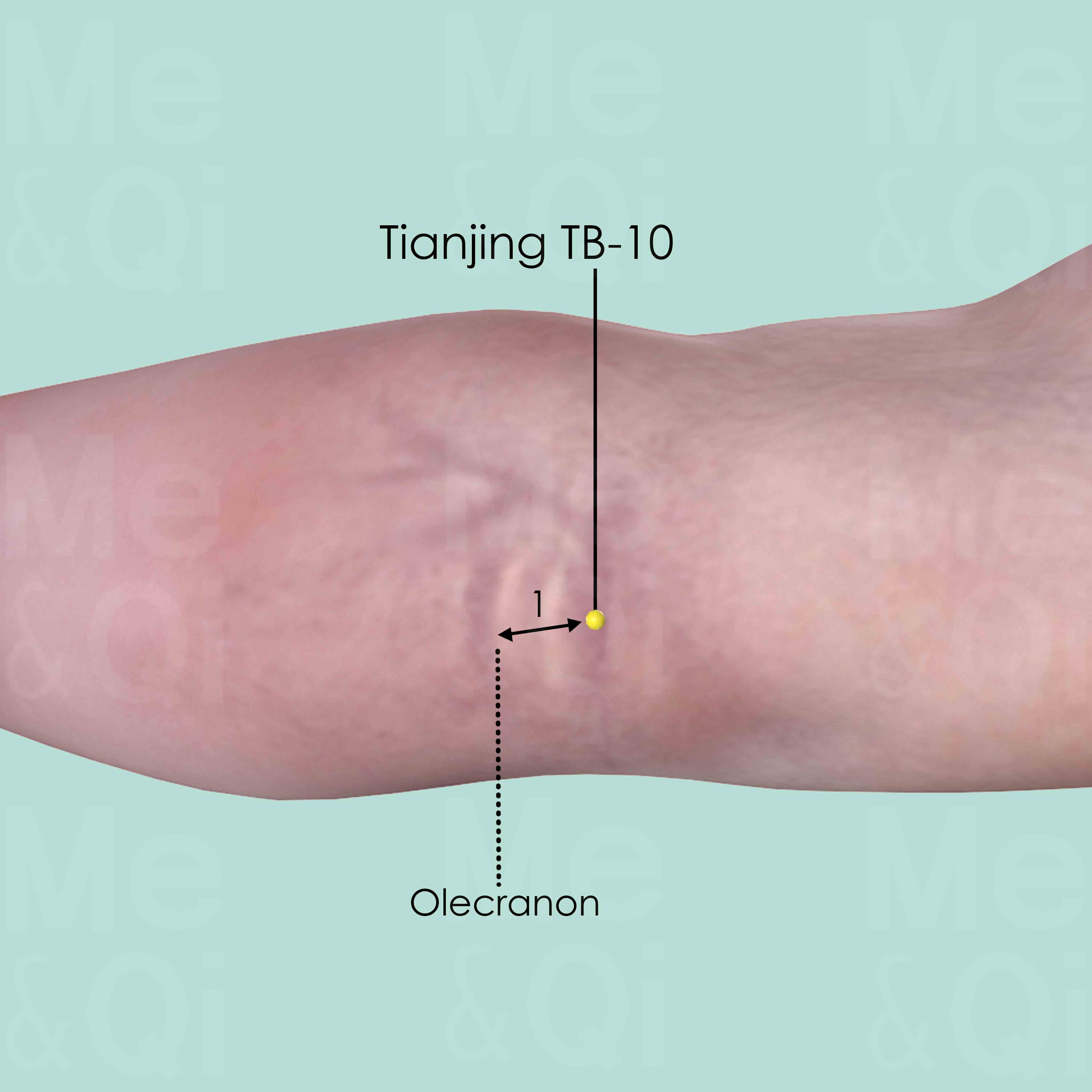
Tianjing TB-10
When the elbow is flexed, Tianjing TB-10 is in the depression about 1 cun superior to the olecranon.

